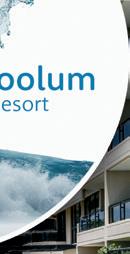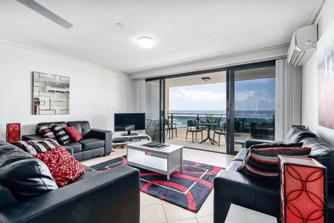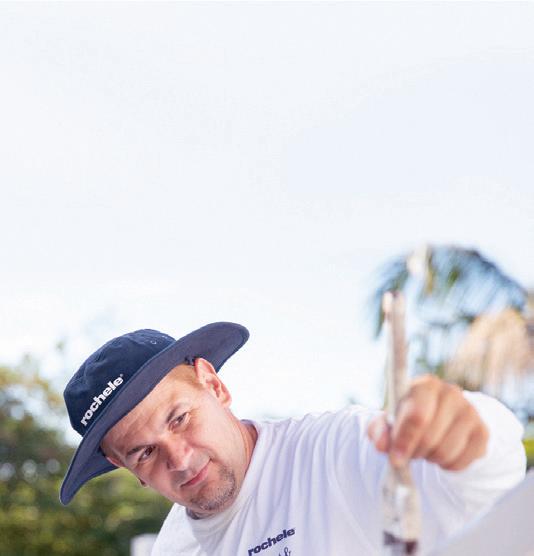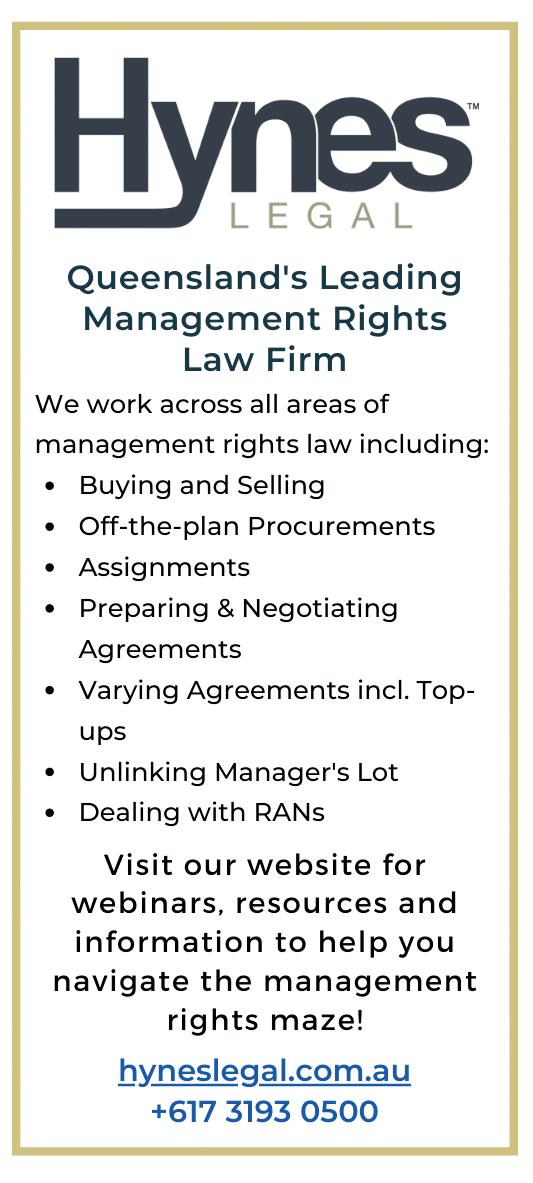






































The views and images expressed in Resort News do not necessarily refl ect the views of the publisher. The information contained in Resort News is intended to act as a guide only, the publisher, authors and editors expressly disclaim all liability for the results of action taken or not taken on the basis of information contained herein. We recommend professional advice is sought before making important business decisions.
The publisher reserves the right to refuse to publish or to republish without any explanation for such action. The publisher, it’s employees and agents will endeavour to place and reproduce advertisements as requested but takes no responsibility for omission, delay, error in transmission, production defi ciency, alteration of misplacement. The advertiser must notify the publisher of any errors as soon as they appear, otherwise the publisher accepts no responsibility for republishing such advertisements. If advertising copy does not arrive by the copy deadline the publisher reserves the right to repeat existing material.
Any mention of a product, service or supplier in editorial is not indicative of any endorsement by the author, editor or publisher. Although the publisher, editor and authors do all they can to ensure accuracy in all editorial content, readers are advised to fact check for themselves, any opinion or statement made by a reporter, editor, columnist, contributor, interviewee, supplier or any other entity involved before making judgements or decisions based on the materials contained herein.
Resort News, its publisher, editor and sta , is not responsible for and does not accept liability for any damages, defamation or other consequences (including but not limited to revenue and/or profi t loss) claimed to have occurred as the result of anything contained within this publication, to the extent permi ed by law.








Advertisers and Advertising Agents warrant to the publisher that any advertising material placed is in no way an infringement of any copyright or other right and does not breach confi dence, is not defamatory, libellous or unlawful, does not slander title, does not contain anything obscene or indecent and does not infringe the Consumer Guarantees Act or other laws, regulations or statutes. Moreover, advertisers or advertising agents agree to indemnify the publisher and its’ agents against any claims, demands, proceedings, damages, costs including legal costs or other costs or expenses properly incurred, penalties, judgements, occasioned to the publisher in consequence of any breach of the above warranties.
© 2024 Multimedia Pty Ltd. It is an infringement of copyright to reproduce in any way all or part of this publication without the wri en consent of the publisher. KEY
Commercially
Supplier information or content
Suppliers share their views in one-o topical pieces
General editorial. Case studies and features may cite or quote suppliers, please be aware that we have a strict ‘no commercial content’
Last month, I attended the vibrant and colourful TRENZ 2024 event in Wellington, New Zealand. It showcased the wonderful experiences tourists can discover in NZ and I was fortunate to get a taste of a few. The standout for me was a visit to Zealandia, the world’s first fullyfenced urban ecosanctuary. This groundbreaking conservation project has a visionary 500-year plan to restore a Wellington valley’s forest and freshwater ecosystems to their pre-human state. Remarkably, it has already reintroduced 18 species of native wildlife to the area, some of which had been absent from the mainland for over 100 years. This extraordinary example of tourism-driven conservation has already resulted in rare birds thriving and spreading throughout Wellington City. It is a must-visit experience.

 Mandy Clarke, Editor editor@accomnews.com.au
Mandy Clarke, Editor editor@accomnews.com.au
Our team also attended the 2024 National Caravan Industry Conference at RACV Royal Pines. This annual event continues to grow in size and extravagance. There, we had the opportunity to catch up with many industry colleagues and suppliers who are also in the management rights sector. But a notable






highlight was meeting the owners of Ritchie Village in New South Wales, who won the innovation award for their design of flood-resistant cabins. Their remarkable problem-solving skills were evident after their park was flooded multiple times in recent years, leaving them uninsured.
Closer to home, I attended two Women In luncheons. It was wonderful to chat with industry colleagues and celebrate with Kelley Rigby, who hosted the Gold Coast event to launch Rigby Property Group. Additionally, the Brisbane hosts at SSKB introduced their groundbreaking new strata app. In this edition, we look at the unfolding strata scandal involving allegations of exorbitant and hidden fees and kickbacks by Netstrata. We also provide an update on the latest body corporate legislation amendments from the Office of the Commissioner
for Body Corporate and Community Management.
Enjoy the interview with entrepreneur Winston Hall on page 14, as he reveals his MLR journey to Grantlee Kieza. One of my favourite tasks this month was reconnecting with Tamara and Geoff Hussin. I caught up with them as they return to the industry following a break after the sale of Ivory Palms Resort. They are back with renewed passion and an ambitious vision for their new resort, Clubb Coolum. Geoff has always been an avid reader and supporter of Resort News – thanks, Geoff ! However, you will find our biggest and cutest fan on page 39 – three-year-old Tommy! His dad, Chris (Switch Hotel Solutions), reports that Tommy’s favourite page is this one – hope he is reading this!
Warm regards, Mandy








 By Grantlee Kieza, Industry Reporter
By Grantlee Kieza, Industry Reporter
The time has come for governments to regulate strata management and set benchmarks for the industry. That’s the opinion of Chris Irons, the former Queensland Body Corporate Commissioner, who now runs Strata Solve, Queensland’s leading strata dispute resolution and problem-solving firm. His comments follow the resignation of Stephen Brell as the NSW president of the Strata Community Association after allegations that his firm, Netstrata, had charged exorbitant and sometimes hidden fees and been the recipient of undisclosed kickbacks.
Mr Brell is the managing director of Netstrata, a naming rights sponsor of the Jubilee Stadium in Sydney, and winner of multiple industry awards. The company last year turned over $66 million, and according to an investigation by ABC investigative journalist Linton Besser, Brell earned as much as $1.2 million in salary and dividends.
The SCA has announced an “independent review” into Brell’s company and the commencement of a “formal complaints management process” against the firm. The government regulator, NSW Fair Trading, has also commenced an investigation.
According to the ABC, Mr Brell confirmed Netstrata had been accepting “referral fees” from a suite of contractors, including debt collectors – all hired with owners corporation’s funds –“without disclosing the quantum
of those kickbacks to its clients. This came despite explicit promises in its annual reports to owners that it would do so.”
The ABC also claimed that Netstrata had been using a wholly owned subsidiary to charge insurance broking fees at inflated rates. These fees had not been routinely disclosed to owners but had reached as high as 64 percent of the base premium when brokers would commonly charge between 5 and 15 percent, and sometimes 20 percent.
The ABC claims that it has received more than “1000 separate reports about suspect activities by a wide sweep of strata management companies.”
Chris Irons says while government mandates on things such as strata training for committees and owners “is not politically appealing at all,” regulation and licensing were
needed for strata management.
“In an ideal world you’d have owners and committees exercising oversight and keeping things on the straight and narrow,” Mr Irons said. “But that largely does not happen.
“My experience with strata managers, and I know pretty much every one of them in Queensland, is that they are professional, diligent people and their reputation has been hurt by the recent controversy.
“I don’t think over-charging is common, but at the moment strata managers in Queensland –and I stress this is in Queensland – don’t have to be licensed or regulated. Anyone can set themselves up as a strata management firm and that’s that. There’s no benchmark of training, no minimum standards and, importantly, there’s no, or very little, consequence, for poor conduct.
“It’s not like the situation with real estate agents where there are disciplinary proceedings, inspectors coming out, and fines. That doesn’t happen with strata managers.
“The time has come for the government to step in. The industry has tried to do it themselves over the years and they haven’t got anywhere.”
Meanwhile, the peak body representing residential accommodation managers has also backed calls for a major overhaul of the strata management sector.
Trevor Rawnsley, the chief executive officer of ARAMA, said his association was appalled by allegations of deceptive conduct, overcharging, and kickbacks by one of Australia’s largest strata management companies and “fully supports strata managers who, like us, deliver service which is in the best interests of the community title scheme”.
“Strata and body corporate management companies play an important part in the ‘triangle of strata management,’ where the resident manager, strata manager, and committee work collaboratively in the best interests of the scheme,” Mr Rawnsley said.
“However, it is clear that unit owners are not receiving value for money by some within the strata management field.
“Resident managers, on the other hand, are also unit owners and have a vested interest in ensuring schemes are managed effectively.”
Mr Rawnsley said the solution was not difficult and pointed to the management rights model that his members operate under.
“Our members operate under a contractor service agreement and code of conduct that includes full disclosure of fees and charges agreed to by the unit owner in advance,” he said.
“There is full transparency, and we must demonstrate good value for money.”
He explained that residential managers have a fiduciary duty to the body corporate, and so do strata managers, “but clearly some strata managers are not fulfilling this duty.”
The ABC also has fielded “persistent reports that some strata managers have protected property developers from building defect warranty claims.”
In the wake of the ABC investigation, the SCA National Council, which includes a representative from every state and territory body, released a public statement assuring consumers it had “listened to the concerns that have been raised … from within the sector and externally.”
It promised to fast-track a requirement for members to disclose insurance brokerage fees that were not previously mandatory.
It also promised a new rulebook for the industry “that clearly addresses conflicts of interest … outside of insurance” with these rules enforced by a new “independent chair” of a “complaints and conduct panel.”
Alisha Fisher, CEO of SCA Australasia, said the industry was “committed to raising standards and improving practices among its members.”
Leading property lawyer John Mahoney said it was “always a difficult question whether we want more regulation of any industry.”
“We complain about red tape, but then we cry out for regulation when someone seems to be doing the wrong thing,” he said. “So it’s a balancing act.
“To me, I would have thought that if there is a need for regulation it’s more around regulating the bank accounts which the strata managers operate because they’re accounts with hundreds of thousands of dollars and they’re not unlike a trust account that a lawyer or agent might have.
“I’m not in favour of regulation for the sake of it. I’m not certain that the industry needs further regulation – to me that is only going to add another layer of complexity and red tape to it.”
Mr Mahoney said the controversy over Netstrata highlighted the fact that the body corporate manager was a contractor “like anyone else and the committee has some level of responsibility to monitor all of their contractors.
“To the extent that a body corporate allows the body corporate manager to do whatever they want – without being aware of what they’re doing, well you could say that to some extent people bring it upon themselves,” Mr Mahoney said.
“In my experience over 30 years it’s very uncommon for strata managers to overcharge. Most are very professional and most are large, well-run, well-managed companies that look after their reputation.
“One thing we do hear a lot about is strata managers picking up a commission for insurance and that’s always a complaint. But that’s something that is always disclosed by the strata manager in their body corporate management agreement.
“It’s always open to a committee if they want to seek alternative quotes, but they generally find they are getting the best deal by allowing their body corporate manager to organise the insurance because of their greater buying power.”
Roland Franz, the general manager of body corporate management firm Body Corporate Headquarters, said: “It would be an understatement to say I was astounded to hear the allegations regarding Netstrata.
“However, I am unable to comment regarding NSW legislation and the Netstrata allegations which I understand are under investigation.
“The BCCM Act requires disclosure of any commissions and relationships that may constitute a conflict of interest.
“Failure to disclose would be a breach of the BCCM Act, code of conduct for a Body Corporate Manager, and in conflict with the fiduciary responsibility of a Body Corporate Manager.
“Further, I believe non-disclosure or secret commissions would potentially be a criminal offence under the Trade Practices Act.”
Alisha Fisher, the CEO of SCA Australasia, said that on March 25 her association had coordinated a meeting of the SCA National Council following the Netstrata revelations.
“We have listened to the concerns that have been
raised over the past few days from within the sector and externally,” she said.
“SCA is committed to raising standards and improving practices among its members as it continually evolves its leadership role in ensuring confidence in the strata sector as a whole.
“To underline our commitment to these goals, SCA Australasia, with endorsement from the SCA National Council, has resolved to take the following actions:
“Fast-tracking the date for the mandatory requirement for SCA members to implement SCA’s Best Practice Insurance Disclosure Guide from 1 January 2025 to 30 June 2024, with full enforceability under the SCA complaints and conduct panel.
“Appointing an independent chair for the SCA Australasia complaints and conduct panel.
“Allocating additional resources and improved accessibility to the SCA Australasia complaints process.
“Commencing the production of a rigorous best practice guideline that clearly addresses conflicts of interest in the strata sector and other disclosures, outside of insurance.
“Offering additional support for SCA member businesses to have access to appropriate resources, advice and training to improve practice where identified.”
Ms. Fisher said the national body would be supporting the independent review SCA (NSW) will be conducting.
She said the SCA had already undertaken a significant amount of work to improve best practice disclosure in relation to insurance in the sector, having worked over the last 12 months with independent expert John Trowbridge in accordance with the recommendations of his report.
She said the SCA would be meeting with consumer, industry, government, and regulatory stakeholders over the coming weeks and welcomed suggestions to improve practices within the industry.
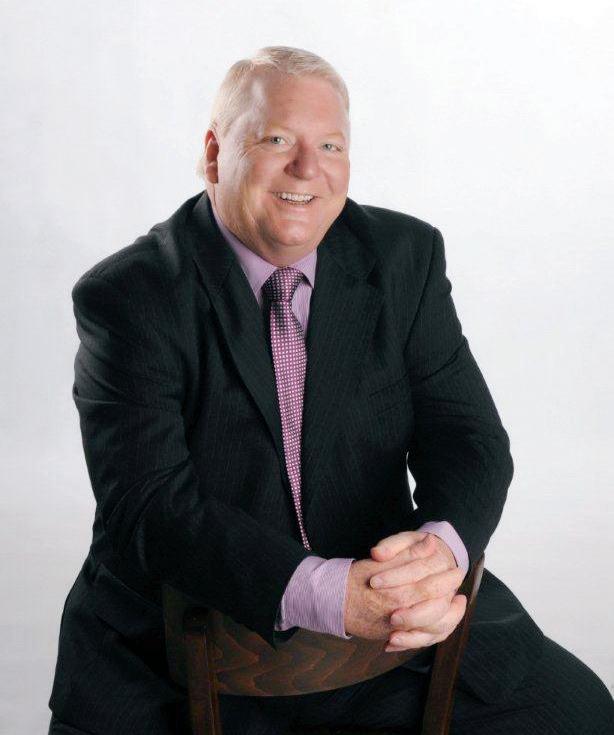
Success in the business of Management and Letting Rights (MLR) is all about building strong and mutually supportive relationships. The most successful resident managers are those who abide by the principles of the triangle of management, fostering great relationships with the body corporate manager and committee.
It’s a given that the best managers put personality differences aside and collaborate towards the best interests of the body corporate, the committee, and the body corporate manager. They go
Every village has an idiot, and you have to make sure the idiot isn’t you
the extra mile to satisfy their owners, residents, and guests.
But the world is not perfect, and conflicts invariably arise. In strata buildings, when we have neighbours on either side as well as above and below us, problems are magnified. It’s rare for a week to go by without a stressed manager ringing our office at ARAMA claiming they are being bullied and harassed in their complex. But ARAMA offers a wide variety of ways to assist our members in these situations.
Whenever our members call regarding issues they are having with body corporate committees and owners, we refer them to our ARAMA Relationship Revival Masterclass (ARRM). The Relationship
Revival Masterclass is a halfday workshop on relationship management – specifically in strata and specifically focused on the relationship between the management rights operator and the body corporate committee. People learn what bullying and harassment really are and how the way they react to a situation is often more important than the situation itself. If a manager retaliates, it can escalate a situation that isn’t bullying and harassment to start with, but which then might turn into that.
We also have a webinar on bullying and harassment in strata on our website, and members also have our member assistance program A-MAP, a crisis counselling hotline, which they can reach out to.
Some members feel they are under so much pressure that they simply cannot cope anymore, and often the stress comes from dealing with neighbourhood disputes involving people who are also affected by the pressures of modern-day life in and around strata. Through A-MAP, our members can pick up a phone, and in 20 minutes they can be talking to a qualified psychologist or crisis counsellor, who will give them the tools and advice to deal with whatever problems they face in these stressful times. The service is free, and members can undertake their counselling face-to-face, via Zoom, or over the phone.
ARAMA is also working with the Queensland Government and other key stakeholders to create “Psychologically Safe Communities” to address the instances of bullying and harassment in the strata title industry. All this work may not actually stop bullies from being bullies, but it will go some way towards creating harmonious communities for people who live, work, and invest in strata.
Not every dispute involving a manager is a case of bullying or harassment, though, and resident managers must sometimes look very hard at their

own actions to see what they can do to remedy the situation. It’s said that every village has an idiot, and you have to make sure the idiot isn’t you. That’s why working on the relationships within a strata scheme –strengthening that triangle of management – is so important.
ARAMA has a wide variety of services that managers can tap into, no matter what problems they are facing in their work environment. One of the questions we often get asked is about providing employment contracts, and ARAMA will be running a webinar soon about the complicated business of industrial relations. There are a whole bunch of new IR laws coming out in August, and they’re quite frightening. So the webinar will be vital for managers.
Industrial relations law has become very complex, and managers need the right legal advice from specialist lawyers. Contacting either Fair Work or a specialised IR law firm is considered best practice, and ARAMA can refer you to such specialists. IR is a specialised form of law, and managers really need specialist experts looking over these contracts.
When it comes to understanding the business of MLR, though, ARAMA will suggest that the member come along to the Management Rights Industry Training Program (MRITP), where they will hear from industry experts, including lawyers, body corporate managers, the Office of Fair Trading, the Office of the Commissioner for Body Corporate and Community Management, as well as experienced managers.
If they need further assistance, ARAMA can refer them to additional industry specialists or law firms.
One of the problems managers face is that the committee sometimes interprets specific tasks in the agreement differently than the way the manager sees them. ARAMA may refer the members to an industry specialist who can perform a time and motion study, where they audit the manager’s current duties and redraft the agreement with sufficient clarity and specificity. A lot of older agreements are very vague, and we recommend that the more
specificity in an agreement, the better, spelling out the required duties and if they are required daily, weekly, monthly, quarterly, or annually. Itemising everything in an agreement and adding as much specificity as possible is so important.
Once upon a time, generic agreements were written with vague expressions for performing tasks, such as “in the fullness of time”, or “to do things in the best interests of the scheme,” or “to maintain gardens to five-star standard.”
All those expressions create uncertainty, and uncertainty can lead to conflict, so it’s important to make those agreements as specific as possible so everyone is on the same page.
Since shelter is a basic need for people, any disagreements over it can make residents feel threatened and trigger them emotionally. That’s what is peculiar about management rights and why there is often so much more antagonism towards resident managers because some unit owners feel their shelter is being threatened in some way – and they feel they are entitled to criticise a resident manager often quite aggressively and in a personal way.
The manager is human, and so they tend to react to defend their integrity, and then you have arguments that often escalate.
As I’ve mentioned, though, sometimes in these situations, the problem is not the other person. Sometimes the man in the mirror has a lot to answer for, and that can be a bitter pill to swallow for some managers.
If some managers reacted differently to criticism, didn’t take it so personally, and treated disagreements as being a part of the business, a lot of these situations would be nipped in the bud.
In ARAMA’s Relationship Revival Masterclass, a lot of time is spent looking at how people react to criticism. In a lot of cases, we find that people might say they are being bullied, but it’s really a disagreement that has gotten out of hand. That relationship needs reviving. That’s where ARAMA can help the manager turn things around so that the relationship becomes mutually supportive. That way, everyone in that strata scheme benefits.


































 By Ben Ashworth, Senior Associate, Small Myers Hughes Lawyers
By Ben Ashworth, Senior Associate, Small Myers Hughes Lawyers
One essential but sometimes overlooked component of a management rights business is having a place to store your caretaking equipment.
Most strata schemes will have an area designated for storage on the common property that the manager is generally allowed to use. This could range from small areas like a cupboard under the stairs to large maintenance rooms and storage sheds. Making sure you have a legal right to use and keep these areas secure is important. A handshake with the chairperson is not enough. Without legal rights approved by the Owners Corporation at a general meeting, the manager can be forced to remove equipment from the common property or even need to share the areas with other owners and occupiers. Ideally, your business should have documented exclusive use of every area you need to operate
| Property Manager | Real Estate Agent | Resident Letting Agent
• Traineeships
• Small face to face classes
• Live Zoom classes
• Delivered in English and Mandarin
• Flexi Learning at own pace
• Recognition of Prior Learning
• Friendly, Experienced Trainers
• Practical Courses for MR Industry
• Qualifications issued promptly
• Competitively Priced
• Free CPD Workshops for Graduates
• Exclusive Online Support Group
Your business should have documented exclusive use of every area you need to operate your business at all times
your business at all times. This view is shared by most banks, and ensuring there is a secure and transferable right to use all storage areas needed for the business is a consideration for the banks when deciding whether to offer finance. If you are planning to sell your business and you don’t have properly documented approval from the Owners Corporation that allows you to use the common property storage areas, it could create significant delays and costs for your sale.
In New South Wales, the Owners Corporation can grant a lease or licence to use part of the common property by passing a special resolution (~75 percent approval). This means that the strata committee acting on its own does not have sufficient authority to grant the manager a right to use the common property for storage. Also note that it takes a special resolution at a general meeting to vary a lease over common property once it has been created. If you are currently using common property areas for storage and you don’t have a lease or licence granted by the Owners Corporation at a general meeting, the sooner you start fixing that, the better.
Although it is possible to include a licence in a Building Manager Agreement, it also means that Owners Corporation approval for
the agreement will require the passing of a special resolution instead of only needing a simple majority at a general meeting. When entering a new Building Manager Agreement, which can be a contentious exercise at best, it is better to avoid making the vote any harder than it needs to be. Therefore, in many circumstances, it may be preferable to enter a standalone licence that sits alongside the Building Manager Agreement rather than an agreement merged with a licence.
There are a variety of ways that a manager can secure their rights to use common property. Choosing the best option for your business can be a strategic decision that needs to reflect your relationship with the Owners Corporation, the nature of your business, and your future plans to sell your business. And if you don’t live in NSW, the ideas discussed here apply everywhere in Australia, but the laws are different. No matter where you live, you should discuss securing your rights to use the common property with a management rights specialist lawyer.
Liability limited by a scheme approved under Professional Standards Legislation.
Disclaimer: This article is provided for information purposes only and should not be regarded as legal advice.








From May 1, 2024, a body corporate can ban the use of smoking products such as cigarettes or vapes on a private balcony following the commencement of the Body Corporate and Community Management and Other Legislation Amendment Bill 2023 (the Bill).
By the Office of the Commissioner for Body Corporate and Community ManagementThe new amendments include various other changes, such as the prevention of bodies corporate banning pets, simplifying the process for towing vehicles, and providing a lower threshold for voting on terminating schemes for economic reasons.
However, it’s the change allowing bodies corporate to make by-
laws that prohibit the use of smoking products on common property, an outdoor area, or within the boundaries of a unit’s balcony or courtyard that may have the greatest impact.
The legislation considers that regularly exposing a person in another lot or on common property to second-hand smoke is a nuisance, a hazard, and an unreasonable interference.
The need to update the legislation to encompass smoke drift as a nuisance and ultimately be
banned by a body corporate by-law follows a landmark order made by an adjudicator from our office and consultation with stakeholders.
The order was handed down in December 2021 in response to a dispute lodged by a ninth-floor owner of an apartment within Artique Resort, Surfers Paradise. The dispute related to smoke that was wafting into their apartment from an owner/occupier smoking in their eighth-floor apartment.
The adjudicator determined that second-hand smoke was not only a nuisance but also a hazard.
In the past, dispute applications lodged about smoke drift relied on the basis that the smoke drift was a nuisance but had not focused on the hazard aspect of section 167 of the Body Corporate and Community Management Act 1997
There is plenty of scientific evidence regarding secondhand smoke being a health hazard, so for many reasons, the adjudication was not unexpected. However, for bodies corporate to pass a by-law banning smoking on balconies and on common property, it will need at least a two-thirds majority at an AGM.
As more bodies corporate ban smoking within courtyards, balconies, and in common areas, we are expecting more inquiries regarding this new legislation.
We find that whenever there are changes to the Act, we do have a spike in disputes and inquiries. For some residents, it’s going to have an impact on their lives. Smoking, after all, is an addiction and a hard habit to break.
Bodies corporate that go down the path of banning smoking within courtyards or balconies could consider a designated

and sheltered smokers’ area on common property that does not impact other residents. This type of designated area would be similar to those found in licensed premises if a body corporate chooses to go down that path. Besides changes to body corporate legislation, schemes may also be impacted by the minimum housing standard introduced through rental reforms. From September 1, 2024, any owners of apartments with existing tenancy leases must ensure they meet the minimum housing standards. These requirements include adequate plumbing and drainage, a property to be weatherproof, secure, structurally sound, including external balustrades, and free of mould.
It means unit owners will be held more accountable and will need to pay more attention to the condition of their property, which in some cases may include common property. It is recommended that bodies corporate act quickly so all maintenance requests that are a body corporate responsibility are acted on to ensure properties can remain tenanted.
This article also appears on realestgate. com.au and the Courier-Mail.
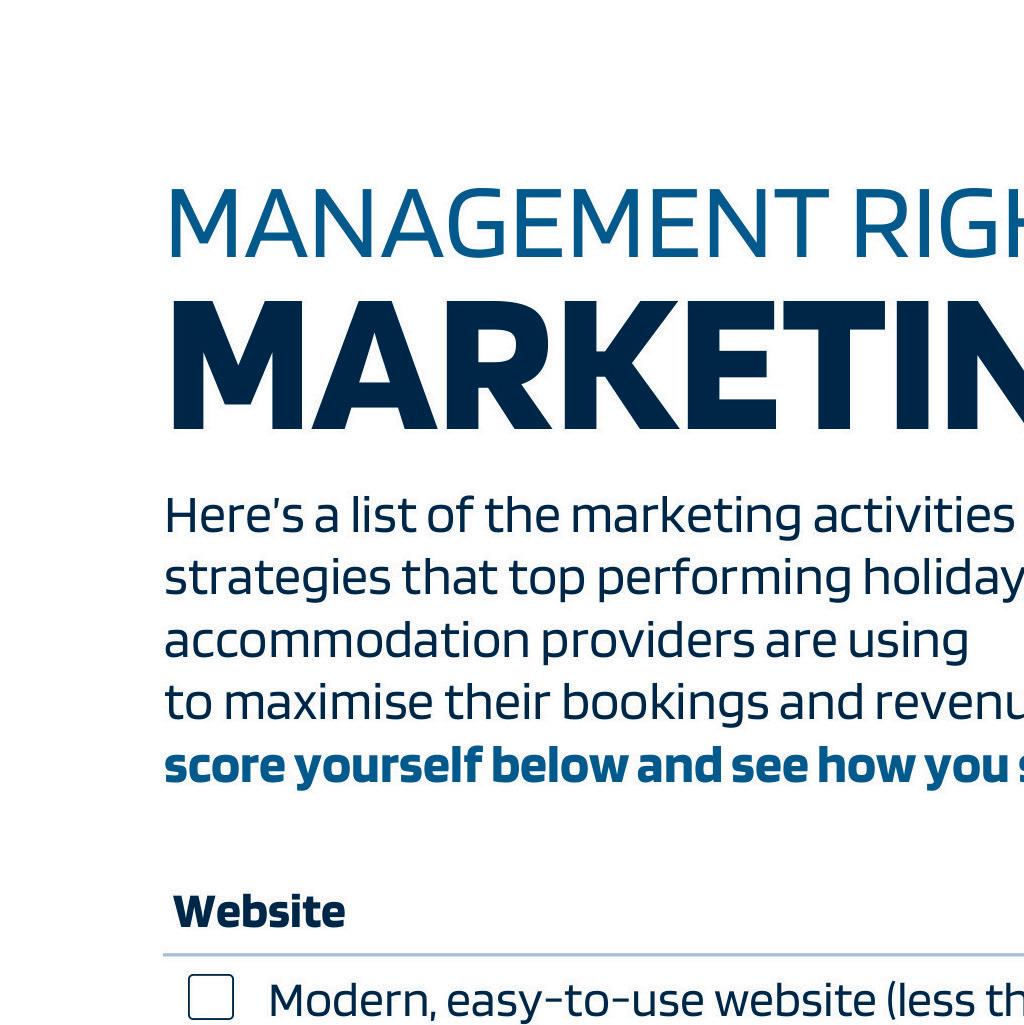
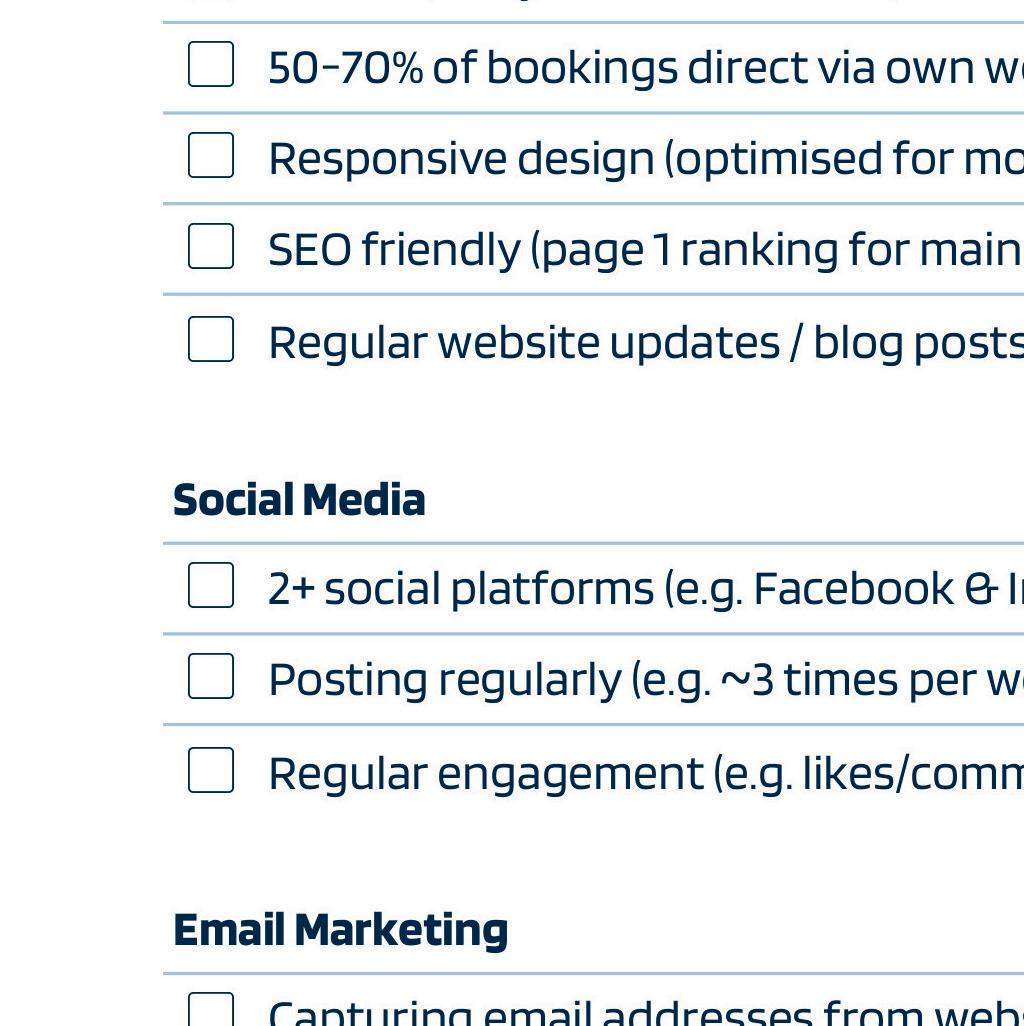


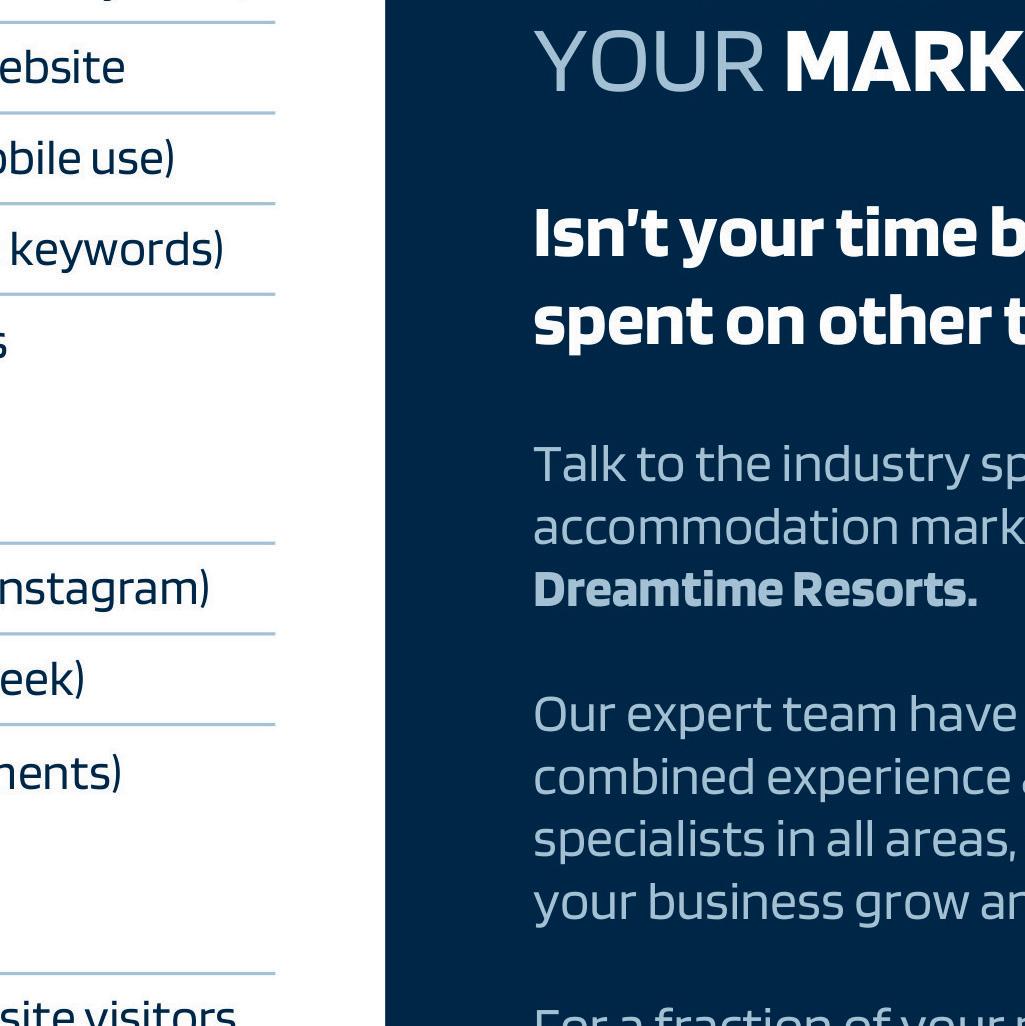




Winston Hall has spent his entire career in hospitality leadership roles and has been immersed in management rights as a corporate high-flyer for over two decades. Not long ago, during his tenure as vice president of operations with Accor, he was responsible for 71 hotels.
But when the father of four decided to leave the corporate world and buy into his own management rights business, he knew he needed to seek out management rights expertise. His purchase of the management rights of Seaview at Mooloolaba on March 1 last year has seen him and his investment partners acquire four major management rights businesses on the Sunshine Coast. This is an impressive achievement, and they are now looking to acquire even more.
Winston credits Mike Phipps and Paul Grant from Mike Phipps Finance and accountant Tony Rossiter from Holmans as being “instrumental” in helping him “understand and craft” his ambitions for this industry.

“All three guys have been fantastic,” Winston said. “Finding the right professionals is essential in this industry, and the knowledge Mike, Tony, and Paul have shared has given me so much confidence.

“I’ve been in the management rights industry for a long time in a corporate structure with lawyers and accountants all over the acquisitions, but when it came to buying management rights, Mike, Tony, and Paul gave me support and a huge

confidence boost to progress with a deal that was a good one.
“They’re the experts in the MLR industry, and they’re brilliant at what they do. Mike and Tony’s company TMC was engaged to support our business in acquiring all four properties.
“Other industry professionals, including Paul Grant from Mike Phipps Finance and the team at Holmans, Peter Brewer from pbb Consult, and Trent Pevy from Pevy Lawyers, have also been
instrumental in working through the smooth and successful completion of each transaction.” Winston sees potential for executives in the corporate area of Australia’s hospitality industry to enter management rights and manage their own businesses.
“There is a real opportunity,” he said, “for many other people like me with corporate backgrounds to buy into management rights, and people like Mike, Tony, and Paul are there to help people achieve their goals.

“My business partner Dave Capper and I have done exactly that.”
Winston bought the management rights at Seaview at Mooloolaba on March 1, 2023, and then eight days later settled on Breeze, the building next door. “Putting those deals together is what formed our parent company name ‘Seabreeze Resorts,’” Winston said. “Ultimately, that entity also bought The Rise at Noosa in September last year and then Coco Mooloolaba in November.
“There have been some challenges for management rights recently with rising interest rates, but broadly speaking, I’ve got a huge level
of confidence in the tourism industry over the next decade or more, particularly on the Sunshine Coast, where I’ve spent the majority of my last 20 years.
“There is a bulging demand for this market as it continues to evolve in the region, and as a group, we’ve taken the initiative to buy four properties here, and we’re looking for more.
“Our investment vehicle is a unit trust, and we have multiple investors who have decided to support us. We embarked on this venture and back the decisions we’ve made. We’re also looking for investors who want to act as operators or managers as we continue to grow.”
“On behalf of Transaction Management Consultants, Tony Rossiter and Mike Phipps would like to extend our congratulations to Winston, Dave and the team at Seabreeze Resorts on the purchase of The Rise Apartments, Coco Mooloolaba, Breeze Apartments, Allure Mooloolaba and Seaview Resort Mooloolaba.”

Specialising in management rights and other accommodation business syndicates





Trent and the Pevy Lawyers team are proud to have acted for the Seabreeze Resorts in their acquisitions and look forward to assisting them well into the future.
Work with the firm that delivers nationwide, industry leading transactional services and advice across all accommodation based business types. Helping hundreds of resident managers and operators each year to acquire, sell, protect and grow their business.
www.pevylawyers.com.au

Chartered Accountants & Specialist Advisors to the Accommodation Sector on the Sunshine Coast Since 1993.
We are proud to have assisted Seabreeze Resorts and the TMC team in their recent transactions.

www.pbbconsult.com.au
Winston grew up on a farm in Harrisville, just over an hour’s drive southwest of Brisbane, and went to school in Ipswich. He was inspired to “have a crack” at a career in hospitality after attending a presentation by a speaker who was running a hotel school out of what is now the Sofitel Hotel at Broadbeach.
He said: “In 1993, I moved to the Gold Coast, and for 12 months I was studying for an associate diploma of hospitality while working in every department of the hotel. I experienced every element of hotel operations, from housekeeping to laundry, room service, and public area cleaning, from sales and marketing to the kitchen, front desk, and night portering.
“I graduated and stayed at the property for a couple more years before I went travelling overseas.” Winston says he got “really serious” about his career when the long holiday was over.
“I came back to Australia and was working at a Quest in Brisbane, and then I moved to the Sunshine Coast in 2000 to work the night shift at what is now the Wyndham at Caloundra on Golden Beach,” he said.
“From there, I moved to what is now Mantra Mooloolaba, but previously an Outrigger property. I was there for four years. Then Outrigger sent me to North Queensland to open what is now Peppers Palm Cove, and I ran three of their hotels in Port Douglas.
“Around that time in 2007, Mantra bought all 14 Outrigger properties in Australia, so I jumped across to Mantra.”
Winston came back to the Sunshine Coast to manage the

properties Sirocco and Zanzibar on the Mooloolaba Esplanade and was also managing three properties as a Mantra’s regional general manager. Before long, he had 15 properties under his watch on the Sunshine Coast and Hervey Bay, and another two years on was looking after 32 properties, with Mantra’s North Queensland operations under his portfolio.
“Then a couple of years later we bought Outrigger Stage 2,” Winston said.
“They had what is now Peppers at Noosa and one at Twin Towns at Tweed Heads, one at Surfers Paradise, and one at Airlie Beach, and I ran the integration of them into the Mantra business.”
In 2016, Mantra bought the management rights for the
1200-room Ala Moana Hotel in Hawaii, which at $7 million was the biggest acquisition for the company at the time. Though he remained on the Sunshine Coast, Winston was on the board of the Ala Moana for six years. During that time, Accor purchased Mantra, and he became a vice president of operations looking after 71 hotels.
“I was very busy but had a bunch of fun,” Winston said.
“I had moved from being a hotel operator into a corporate operational role, and my days were spent focused on the corporate requirements for running hospitality businesses.”
In 2021, Winston’s third child was born, and he admits this changed his perspective.
“I had spent so long in the
corporate world, but I’d always thought about getting into my own business. Management rights was always on my mind,” he said.
“I didn’t know the best way to go about it, but I wanted to buy a business in Southeast Queensland to stay close to home and spend time with our new baby growing up.
“Mike Phipps, Paul Grant, and Tony Rossiter were key in showing me how to make it a reality.”
Winston brought in Dave Capper, a former colleague at Outrigger, to help run the first two businesses, Seaview and Breeze, which were bought just eight days apart because Winston was now helping his wife take care of their fourth child, born in April 2023.
Now with four properties, Seabreeze Resorts has engaged Pinnacle Marketing, a sales and marketing and revenue management company.
“Their main focus is to access distribution in a broader way than direct business and OTAs as they have very strong relationships with many different trade partners,” Winston said.
Revenue for the four properties was rising for most months compared with previous years, and despite economic headwinds, Winston said he was navigating the business with an eye to the future.
“I think management rights is a wonderful industry,” he said, “and I see it giving many people the opportunity to grow their own successful businesses in the years ahead.”



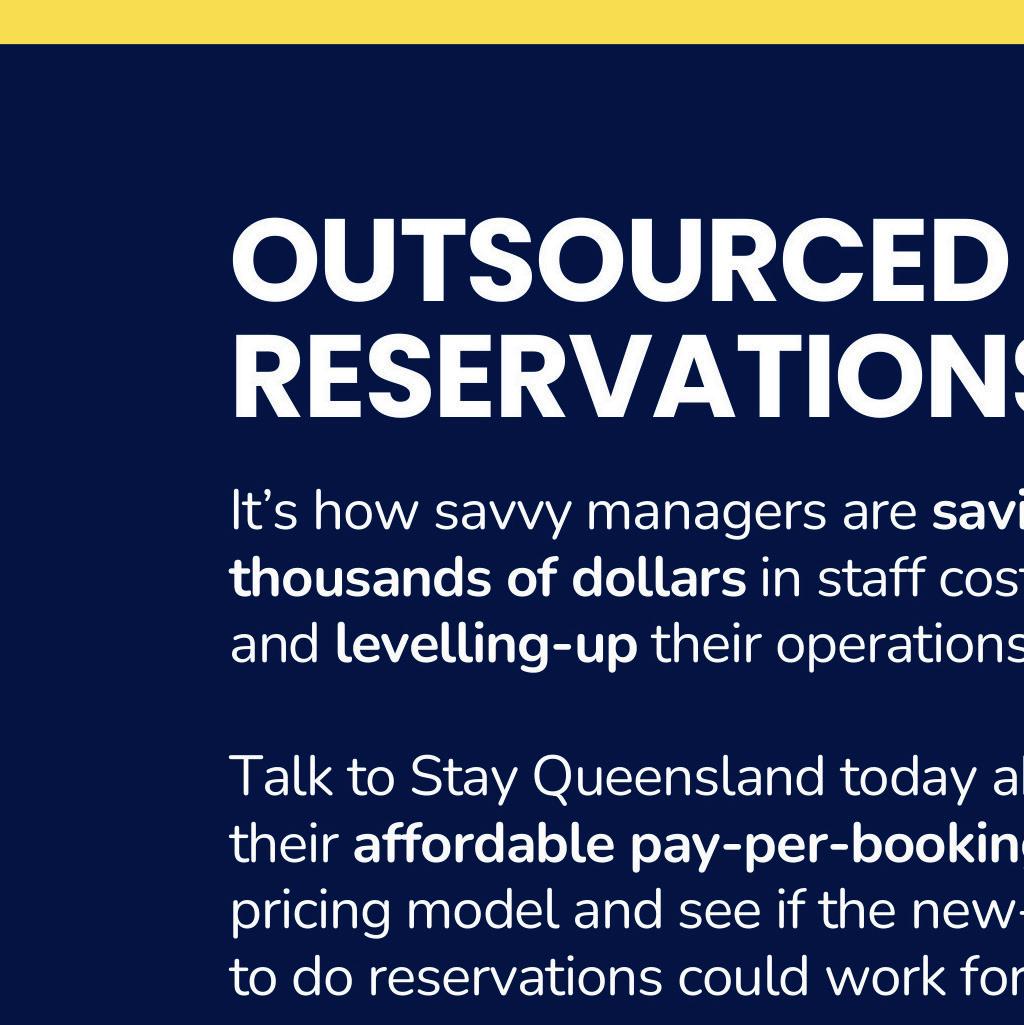


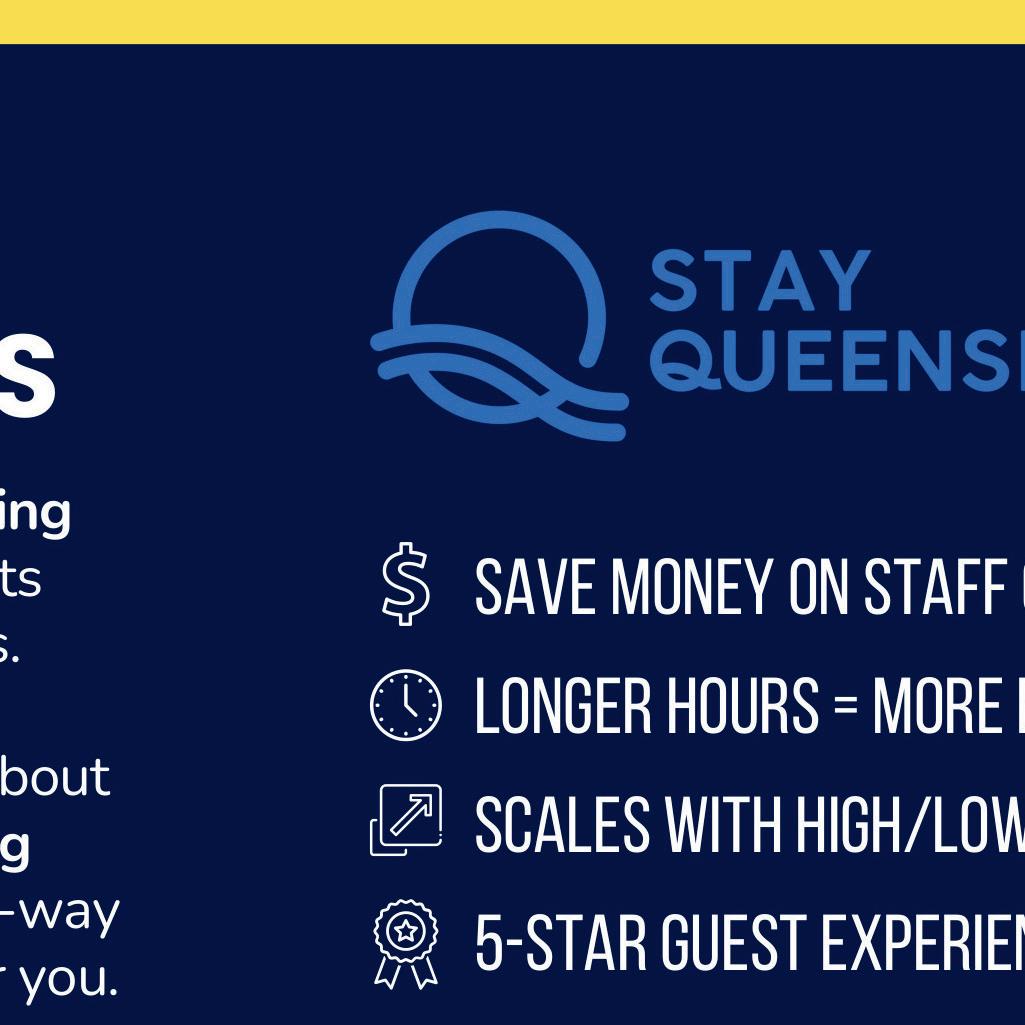











Anyone familiar with a rent roll sale or purchase will be aware that a buyer only pays for the actual letting appointments in place at settlement, and these transactions have invariably always come with a clawback mechanism.
Typically, 20 percent or so of the sale price is held in a trust account for three months or more following settlement. At the end of that period, the buyer is paid the value of any letting appointment terminated by an owner.
Historically, there was nothing like that concept with a management rights sale. The price was based on the past year’s income and bore no relevance to the number of units in the pool at settlement. The likely reasons for that are:
• Management rights and the sales of them were originally unique to the Gold Coast, where the agents and lawyers adopted an approach of Gold Coast casualness, including nothing in a contract that might complicate the deal.
• Multiples of around 3 had already factored in the risk of losing units from the pool.
• Letting pools hardly varied in number over many years.
• Losing units from the pool was not a real risk as the onsite manager was best placed to let out units and faced minimal, if any, competition from external agents.
Things changed about 10 years ago when there was a noticeable shift in the makeup of owners in many strata complexes with a trend towards owner-occupiers. Management rights buyers found that between contract signing and settlement, sometimes a sixmonth or more period, it was not uncommon for the letting pool to drop – sometimes substantially. With multiples at 5 and above, the impact of a lost letting appointment on the value of the business could be significant. Many buyers found that by the time they got to settlement, the letting pool – and the value of the letting component of the business – had dropped by up to 20 percent or even more.
Some buyers started asking for a clawback provision in the contract to protect them from such a situation. An industry forum held on the Gold Coast lent tacit support to the concept, and industry standard clawback provisions were incorporated into the generally used special
conditions. Despite agents and sellers’ lawyers initially opposing the concept, over time it became the norm.
Unsurprisingly, the clawback concept has been limited to letting appointments lost between contract signing and settlement. Unlike a rent roll sale contract, it does not extend to any period post-settlement. It also became common for sellers to ask for a clawforward provision so that the sale price would increase if the letting pool increased in size. That could be problematic for a buyer and a buyer’s financier as if there were to be a significant increase in the purchase price, where would the additional funding come from? So buyers sought to limit the number of clawforwards, which in turn led sellers to ask for a limit on clawbacks.
Initially, clawbacks and clawforwards were limited to permanent complexes. It was perceived that as holiday and short-term letting complexes only operated at around 60 percent to 80 percent occupancy, the loss of up to 20 percent or so of units would not impact the letting income. Some complexes, though, run at much higher occupancy levels – for example, Noosa beachfront occupancy levels are close to 100
percent and produce massive letting income. So gradually, buyers in holiday complexes started asking for a clawback –and the sellers for a clawforward. It becomes even more complicated when a complex has a mix of permanent and short-term or holiday units in the letting pool!
Unsurprisingly, in most management rights transactions, there is quite a bit of precontract negotiation about the clawback and clawforward provisions of the contract. Depending on the nature of the complex, the negotiations can be simple or complicated and may or may not involve lawyers and accountants. Different values might be attributed to the first, second, or third appointment lost or gained. Sellers may well point to the increase in body corporate remuneration and rents which will offset some loss of units from the pool – all part of the negotiations.
Today, the concept of clawbacks is well and truly entrenched in the industry. It will not go away anytime soon, if at all. It is something which all buyers have to consider and something which all sellers have to expect to be raised.

 By Andrew Morgan, Motel Broker/Partner, Qld Tourism & Hospitality Brokers
By Andrew Morgan, Motel Broker/Partner, Qld Tourism & Hospitality Brokers
As a flashback to last month’s issue, we examined how the dayto-day operations of every business can easily consume most of the owner or manager’s time.
When trading is strong, operating costs are not an issue and are far from the forefront of the mind. However, when trading declines, the opportunity to look closely at excessive operating costs and how they can be reined in becomes more available. It’s only when a business operator drills down on specific expense items that they realise costs have sneakily blown out without being identified earlier.
Considering some of those expenses we touched on last issue included interest on finance, cost of sales (stock), advertising, pay TV, bank and merchant fees, commission, and electricity and gas.
Let’s now continue with the following costs that will devour revenue if not kept in check:
Laundry: There have always been differing opinions within the industry as to what is the most cost-effective, onsite or off-site?
Off-site involves the cost paid to the laundry for pick-up and replacement. Onsite involves the cost of wages, electricity/ gas, linen purchase, water, and chemicals. If off-site, then shopping around (if options are available) is a possibility; if onsite, then looking into reducing the costs of chemicals, power, and labour. Power savings were discussed in the previous issue with solar or wholesale options as a possibility.
Insurance: This is a big one with a few different issues. Reducing the cost is one problem, but sourcing insurance can be another. Contacting other business owners and finding alternative insurance providers is a must here. Left to simply an annual rollover without review, premiums will skyrocket without intervention. Seek alternatives if you are not happy with the offering. Consider what the premium was the previous year and what is being offered now and why. Look at the sums insured and the excess. Really pull it apart and determine if you are over or under-insured.
Rent: For the operation of a leasehold motel, this expense is very important. Is the rent an acceptable market rent, or is it
too high or low? Rents evolve over time, as does the market. Over the course of time, they can become too high or low depending on the circumstances, and open communication and understanding between the relevant parties work both ways.
Repair, maintenance, renovation: The 40 percent increase in the cost of building since 2019 results in this area of expenditure becoming problematic. Maintaining the required standard of presentation means constant repairs or upgrades. Completing this efficiently and cost-effectively requires time and consideration. Seek costeffective replacement items and quotes to ensure the required job is being completed as opposed to something that may be excessive or more cost-effectively rectified. I include renovation here, although it is thought of as a capitalised item; however, with changing taxation opportunities, some of these costs can be expensed immediately rather than being depreciated over time.
Subscriptions: What industry or non-industry bodies is the business subscribing to? Often businesses sign up to various groups because it seemed like a good idea at the time, and all of a sudden, when you drill down on what and who you are paying to be a part of each month, a lot of these are no longer relevant or of interest. Cut what is no longer beneficial and being doubled up on.
Telecommunications (telephone and internet): Making sure one is on the best and most relevant plan/deal available can save dollars. How many phone lines are required? Is the data plan the best for the individual business? Is there a better option available with your current provider or with another? There are a lot of questions that need to be answered here, and discussions with the provider (which can be long-winded and require time) can be productive.
Wages: Wages can often be the largest individual expense item within an accommodation business. Constant monitoring can only assist as far as areas such as cleaning go. The amount of time required to clean a unit correctly without being excessive depends on many factors, such as unit size, self-contained or not, floor coverings, number of beds, etc. ‘Deep cleaning’ is a common term for many businesses, which may just be an extension of the ‘spring clean’ that was conducted regularly anyway. Consider wages in all areas of the accommodation business: units, reception, kitchen/ restaurant, yard/maintenance. Are these areas operating as efficiently as possible?
All the above items are easily put to one side when occupancy rates are high, and business is good. Take advantage of the opportunity to streamline them when things are not so busy.
 By Lel Parnis, Principal, Holmans
By Lel Parnis, Principal, Holmans
From May 1, 2024, two new regulatory forms will replace the existing Property Occupations Form 6.
• Form 6 will be used for residential property appointments.
• Form 6A will be used for commercial property appointments. These changes will help provide greater clarity to people completing the forms, streamline the process, and enhance the effectiveness of property transactions.
Before you make any big changes to your Form 6 or Schedule, please contact your accountant
From May 1, 2024, you must use the new forms when entering new appointment agreements or updating existing agreements. You do not need to complete a new form to continue an existing appointment after May 1, 2024. Appointments made through the current Form 6 will remain valid until they are terminated as per the existing agreement.
This might be a great opportunity to use the issue of the new Form 6 as an “excuse” for requiring the
Form 6 to be updated, including any revised fees and charges. You can blame the OFT for the need for the new standard Form 6 and use the opportunity to get everything updated in the process. Using a digital signing platform to send the updated agreements to owners will also make the process easier for yourself and your owners.
Before you make any big changes to your Form 6 or Schedule, please contact your accountant to ensure you or the owners aren’t negatively impacted by the changes.
When updating or issuing new agreements, please ensure cancellation fees are addressed – something which is at times overlooked. The cancellation fee needs to be dealt with in accordance with your Letting Agreement signed with the owners, and thus your addendums should stipulate any cancellation fees attributable to management.
• Ensure your Letting Appointment Addendum addresses cancellation fees – we recommend using the ARAMA Addendum.
• Ensure you have an administration fee set out in your Schedule of Charges. If you do not have an administration fee in your schedule of charges, ensure you include a fee when you next update your appointment, or ensure you have communicated the administration fee with the owner before charging.
 By Mike Phipps, Mike Phipps Finance
By Mike Phipps, Mike Phipps Finance
“I am not evading tax in any way, shape or form. Now, of course I am minimising my tax and if anybody in this country doesn’t minimise their tax, they want their heads read because as a government, I can tell you, you’re not spending it that well that we should be donating extra.”
– Kerry Packer November 1991, in answer to questions during a parliamentary enquiry.
And so, as end of financial year rolls around once more the immortal words of Kerry Francis Bullmore Packer ring truer than ever. One might even suggest that actual evasion should be encouraged such is the level of waste and fiscal ineptitude currently on display in Canberra. Surely we are witnessing a new benchmark from a mob who appear unable to organise an encounter on licensed premises or a beverage in a brewery, let alone on any budget project or infrastructure delivery. The question must be asked. Why pay more tax? It only encourages the idiots to waste even more money. Time to scheme and plan. Now, I acknowledge that greater minds than mine will doubtless churn out all manner of pre-30 June strategies and advice. However, as I’ve mentioned before, I’m a simple bloke and so I’ll adhere to the KISS principle. Having said that, I
believe the run-up to EOFY is a great opportunity to look at your financial situation more broadly and contemplate strategies that go beyond the looming date. I’m not going to try and cover every lurk and perk, but here’s a few to think about.
Let’s start with superannuation. The contributions cap is now $27,500 for each contributor. That’s $55,000 for most couples taxed at 15 percent. Contributions need to hit your super fund by June 30 so plan accordingly. If you don’t have the dough talk to your accountant about the merits of borrowing the money, including redrawing advance loan repayments. Remember, if you don’t contribute the maximum allowed up to the 15 percent tax threshold, you
may be able to make this up in future years via carried-forward contribution rules. Super is a minefield, so talk to an expert… no, I am not an expert.
While your mind has turned to super, a word on SelfManaged Super Funds (SMSF). These are most certainly not for everyone, but if you are a reasonably sophisticated investor who wants to make your own investment decisions regarding retirement planning, then they may be for you. The contributions rules don’t change but rather than a fund manager deciding on investments, the trustees of the SMSF do so. Commonly the trustees and the beneficiaries are the same people albeit the trustees are responsible for the fund.
Any assets owned or controlled by the beneficiaries and trustees need to demonstrate a reasonably sophisticated, arm’s length investment strategy. A simple way to look at this is that you should understand the asset class, have done some research and have assessed downside risk. Oh, and you can’t acquire an asset in a SMSF from which you may derive some immediate personal enjoyment. You can buy that vintage Ferrari or Van Gogh watercolour but no driving, admiring, touching or general drooling. Sorta like a sign I saw in a bar once, but we digress!
A compelling exception to the ‘no personal use’ rule is your owneroccupied business premises. There is nothing to stop you from acquiring premises in your SMSF and renting them from the fund.
Rent needs to be at market value and reviewed annually and you’ll need a formal lease in place. The benefits of this arrangement include certainty over business premises tenure, 15 percent tax on the rental income flowing to the fund and hopefully, future capital gain. The current legislated settings encourage security of tenure, an active commercial property market and a bona fide pathway to improving retirement savings. It can’t last!
If you are uncertain about an SMSF here’s a thought. Review your current industry fund super balance and portfolio, pretend you have rolled it into an SMSF and you are making the investment decisions. Then build a virtual portfolio and monitor the outcome. For example, you could decide that your virtual portfolio might include investments in management rights syndicates, a bit of property and a few blue-chip equities. Maybe even a commercial property leased to your trading entity. If you are doing better after 12 months I guess you have the answer. Likewise, if all the virtual money is gone, that’s
also an answer that has cost you nothing but a bit of time. And now, a few of the usual suspects.
In these days of work from home, your domestic office and associated costs may present a tax deduction worth contemplating. A share of household internet and power costs is a starter but beware. There may be capital gains tax implications if you sell your family home and you have been claiming part of it as a workspace or business premises. It’s called incentivising you to sit in gridlock with the engine running rather than saving the planet. Genius!
Brought forward expenses are an oldy, but a goody. If you’ve got the cash flow, prepaying expenses relating to the following financial year gives you a tax deduction pre-30 June. Of course, the party you pay now has additional income to be taxed on, but that’s hardly your problem. For those with loads of cash sloshing around the opportunity to prepay loan interest might be worth considering as well.
A bit like prepayments, now can be a good time to decide if you need any new equipment. Remember, small businesses with less than $10M in turnover can claim a full write off on eligible gear up to $20,000 in value. The instant asset write-off rule sure beats year-on-year depreciation deductions. It is worth noting that taxpayers can only pay up to 13 months in advance (small business entities only). Also, a decrease in personal tax rates in 2024-25 may present the opportunity for some to defer income/bring forward expenses (provided all at arm’s length of course).
In closing, it would be remiss of me not to make some comment on the recent Federal Budget and likely interest rate trends. Having reviewed the key elements of the 2024-25 plan, I am moved to suggest that Jim Chalmers and Anthony A are geniuses. Despite an overwhelming majority of economists rating the plan as underwhelming, unconvincing and downright terrible, I think the Feds are on to something. Surely, increasing real wages and pumping tax and debt funded handouts
into any market with no linked improvements in productivity will stifle inflation. I mean, it’s never worked in any economy anywhere on God’s earth but here in Oz, we are different. In particular, we are very different to Argentina, a resource-rich country and a once economic powerhouse. Sadly, the economy has collapsed a few times and inflation has decimated the value of the currency. Historically, most researchers put this down to growing government spending, large wage increases and inefficient production. But… here in Oz we are different.
Here is one last EOFY tip. Fix your interest rates and strap yourself in. Turbulence awaits.
Disclaimer: The writer is not a financial advisor. Readers should seek professional tax planning, wealth and asset management advice. SMSF advice is highly specialised. We make no claims or warranties as to actual interest rate trends. Do not act on the content of this article alone. We do not endorse or encourage tax evasion or any other unlawful pursuit. It’s a joke people!





 By Roland Franz, General Manager, Body Corporate Headquarters
Strata Consulting Services (Qld)
By Roland Franz, General Manager, Body Corporate Headquarters
Strata Consulting Services (Qld)
In strata property management, successful collaboration among key players is the cornerstone of a thriving community.
The building manager, the committee, and the body corporate manager each play crucial roles in ensuring a seamless and positive strata experience. Their collective fiduciary responsibility is to maintain the strata community assets – building, facilities, and grounds – while always acting in the best interests of owners and residents.
The building manager/caretaker often wears multiple hats, including that of a letting agent, especially in schemes where they have purchased management rights. Their primary responsibilities revolve around the day-to-day management of the property, including common property maintenance coordination, by-law reporting, as well as additional services as engaged under their caretaking and letting agreements. This means they ensure all communal areas are well-maintained, address repair needs promptly and coordinate with service providers for routine maintenance tasks.
Letting agent responsibilities extend to tenant acquisition, lease management, and property
maintenance coordination internal to the lot. They handle marketing vacancies, screening potential tenants, and facilitating lease agreements. Their knowledge of the property’s intricacies allows for efficient management and resolution of issues, significantly contributing to the property’s overall appearance and reputation.
The body corporate manager acts as the central administrative figure, serving as a liaison between the committee, property owners, and external stakeholders. Their responsibilities encompass organising meetings, preparing budgets, and ensuring compliance with legislative requirements. They facilitate administrative, financial, and legal matters, ensuring transparency, adherence to regulations, and equitable outcomes for all owners. This includes preparing financial statements, managing the body corporate’s bank accounts, and ensuring all statutory obligations are met. Notwithstanding that the instructions in performing these duties are taken from the committee.
One of their critical roles is to facilitate communication and coordination among the various stakeholders. By organising regular meetings and maintaining clear records, the body corporate manager ensures all parties are informed and engaged in the decision-making process. They collaborate closely with the building manager/caretaker and committee to align plans, budgets, and actions, ultimately enhancing the property’s value, desirability, and community experience for residents.
Representing the collective interests of property owners, the committee assumes decisionmaking authority within the body corporate. Their duties include formulating policies,
enforcing by-laws, and making decisions on behalf of the body corporate. The committee ensures that property management activities align with strategic objectives and governance priorities, contributing to transparency for owners.
The committee consists of elected property owners who typically volunteer their time to oversee the management of the scheme. They set the direction of the body corporate and ensure the management team acts in the best interests of all owners. This includes approving budgets, approving maintenance items, and planning for capital works, by-law management, and addressing disputes that may arise within the community.
When the building manager, committee, and body corporate manager work together proactively and collaboratively, the benefits to the strata community are substantial:
1. Enhanced property maintenance: Collaborative efforts ensure that maintenance issues are addressed promptly, preserving or enhancing the property’s condition and reducing the risk of costly repairs.
2. Increased property value: Properties managed effectively and maintained well typically see an increase in market value, benefiting all owners.
3. Improved tenant satisfaction: A wellmaintained and efficiently managed property attracts and retains tenants, ensuring stable rental income and a positive living environment.
4. Streamlined communication: Clear roles and regular communication between the building manager, body corporate
manager, and committee ensure that all stakeholders are informed and engaged, fostering transparency for owners as the management team works towards achieving common goals.
5. Regulatory compliance: The body corporate manager’s expertise in legislative matters ensures that the property remains compliant with all relevant obligations.
6. Strategic planning and decision-making: A unified approach allows for more effective forward planning. The committee, with input from the building manager/ caretaker and body corporate manager, can make informed decisions that align with long-term goals and owner interests.
Clear and effective communication, defined roles, and collaborative effort are the keys to unlocking the full potential of property management dynamics that will enhance the customer experience and foster better capital gains and returns for owners in strata-titled schemes.
• Letting agent: Internal lot maintenance, tenancy applications.
• Building manager: External lot maintenance, common property maintenance, behaviour of residents and guests, by-laws, general inquiries relating to occupancy or use of common facilities
• Body corporate manager: Owner lot improvements, approvals and applications, levy inquiries, body corporate records, meeting notices and minutes, insurance claims, administration, and other general inquiries. Suggested topics for future comment are welcome contact via editor@resortnews.com.au







 By Chris de Closey, Switch Hotel Solutions
By Chris de Closey, Switch Hotel Solutions
In today’s digital age, video content has emerged as a crucial component for engaging audiences on social media platforms.
Video content can assist in boosting your organic reach and engaging new potential guests much more effectively than other mediums. Don’t get me wrong, there is always a place for static content; however, the emergence of video and focus on this from the social media platforms means that you have an ability to reach a far wider audience than previously possible. All of this for little to no cost – just your time!
Video content offers dynamic storytelling capabilities that are unparalleled by static images or text alone. It provides a sensory-rich experience, allowing viewers to immerse themselves in the content.
I know what you are thinking, “Chris, I wouldn’t have the first thought about how to create video content.” That’s okay! I am about to give you some inside tips on how to make easy steps forward.
One of the simplest ways to produce video content is by utilising footage created by your guests. Encourage them to share their experiences on social media by creating hashtags or running competitions.
This not only provides you with authentic content but also increases engagement and trust among potential customers. Repost this footage on your own channels (with their permission, of course).
You don’t need high-end equipment to create impactful videos. Modern smartphones have amazing cameras that can capture high-quality video. Use a tripod and natural lighting to enhance the production quality without breaking the bank. Tripods will stabilise the video, giving a smoother, cleaner feel in the footage. You can pick up a tripod online for under $30.
Offer your audience a glimpse behind the scenes at your property. Whether it’s showcasing your housekeeping daily preparations or the effort that goes into room servicing, these videos can create a personal connection and showcase the quality of your services. A bonus if you have the common area videos – if you are operating in a strata environment, the body corporate and owners will love it and it shows your dedication to the complex. You’ve got the video, now what? When you are creating your video content, you don’t always need to edit the video; however, editing will give it a much more polished look. There are a tonne of apps to use to help your editing – CapCut is a great one to use. Always do some research to find what will work best for you within your budget.
Remember – when posting video content, the key is to ensure that you are optimising for silent viewing. Many users scroll through their feeds in environments where they can’t play sound. Adding subtitles with the visuals ensures your message comes across, even in silence.
Now you’ve got the base set for creating videos, you are looking for some ideas! Well, I come with plenty of them – some are super easy, and others may
take a little more planning.
Customer testimonials offer a great way to share positive experiences from real people. Testimonials don’t need much editing (apart from captions, of course), you can do it in one take and voilà! You could focus on an event that is in the area with some highlights of the day, like a local surf comp, big events like marathons, music festivals, and more. Local attractions, theme parks, and cultural events also make the list.
All these ideas create an opportunity to showcase your property and local attractions. Another unique way you can create content is to show “how-to” tips. Think of how to make a bed “hotel style” or, if you have a kitchen, your chef can show some recipe tips, tricks, and “secret recipes.”
Video content is an amazing way to showcase your property. It doesn’t have to be hard to generate the content, but always remember that creating compelling content will resonate with your audience and help you grow your visibility one post at a time. Don’t always measure your success by the number of bookings you generate from a piece of content; your social media content is about being front and centre for your potential customers to think of you when they do eventually get to that booking decision.


















 By Lynda Kypriadakis,
By Lynda Kypriadakis,
According to the Commissioner for Body Corporate and Community Management in Queensland (reference Best Practice Hints & Tips article dated Sept. 28, 2023), residents of strata properties are increasingly moving toward zero-emission vehicles, including electric vehicles, hydrogen vehicles, and fuel cell vehicles.
The Commissioner’s article predicts that 50 percent of vehicles in Queensland strata properties will be zeroemission vehicles by 2030, and 100 percent by 2036. The implications of EVs on strata properties (from the perspective of the Body Corporate and Community Management Act compliance) are well documented within that article, so they are not repeated here. What is not so well known are the Australian building code requirements concerning electric vehicle charging infrastructure within Class 2-9 buildings – particularly around fire compliance and smoke control.
It is emerging that electric vehicle batteries pose a unique challenge in terms of fire safety. Unlike conventional internal combustion engine fires, EV battery fires present unique hazards that require specialised training and equipment to fight. EV battery packs store

a lot of energy in a very small space, and when damaged, an internal short circuit triggers a chain reaction called thermal runaway. The battery pack then generates more heat than it can dissipate and catches fire. Not only are EV battery fires very hard to extinguish, but the complex nature of lithium-ion batteries means they can reignite hours or even days after the initial incident, creating prolonged risks for both responders and the public.
According to EV car fire statistics from the USA, as of June 2023,
EVs apparently have had a fire rate of one for every 175 million miles travelled. Compare this to the USA average for conventional internal combustion engine vehicle fires, which occur (on average) once for every 19 million miles travelled.
Fire and Rescue NSW said in a report issued in March 2024 that none of the 456 lithiumion battery fires it attended in 2022-2023 involved electric vehicles. The three top culprits were instead e-mobility devices like e-bikes and e-scooters (90), battery chargers (46), and energy storage batteries (37).
Given that e-mobility devices are small enough to be wheeled inside units, the associated fire risk inside people’s homes is concerning – particularly in a high-density apartment complex.
A study conducted by Western Sydney University in July 2023 titled “Fire Incidents, Trends, and Risk Mitigation Framework of Electrical Vehicle Cars in Australia” discovered that if EV uptake in Australia follows the projected trend of reaching 1.7 million by 2030, there will likely be nine to 10 EV fire incidents in Australia in that year.
50 percent of vehicles in Queensland strata properties will be zeroemission vehicles by 2030

So, the risk of EV fire (compared to conventional car fire) appears to be relatively low, but it is the “type” and nature of fire caused by EV batteries that is most concerning. The global experience of EVs to date indicates they have a lower likelihood of being involved in a fire than internal combustion engines, but the characteristics of battery fires are vastly different from liquid fuel fires. Fire is one thing, but there appears to be less awareness of the highly toxic combustion products that are released and their respective impact on the health and well-being of those exposed to the gases. The toxic fumes are the bigger concern.
The Australian Building Codes Board (ABCB) is the standardswriting body responsible for the National Construction Code, the Building and Plumbing Codes of Australia, the WaterMark and CodeMark Certification Schemes, and regulatory reform in the construction industry. The ABCB is currently working with other government bodies and emergency response agencies to review the latest evidence on EV charging trends from around the world. The ABCB is working to review and update our national guidance and/or regulatory response, as needed. The primary objective of the ABCB work around EV fire risk is to formulate recommendations for building infrastructure controls that can support the safer installation and use of EV chargers without being an unreasonable barrier to adoption (reference June 2023, Version 1.0 - © Commonwealth of Australia and States and Territories of Australia 2023, published by the Australian Building Codes Board).
It is likely that the National Construction Code will eventually impose building requirements on EV charging infrastructure across Australia when EV charging stations are installed within the common property of residential strata properties. Diligence around Building Code and certification requirements should be applied at the feasibility and planning stage of any EV charging station upgrade project. Following is a checklist to consider when planning an EV charging station project.
ABCB EV Checklist: To support safer EV charging in residential strata properties in Australia, the ACBC recommends:
• Master isolation: Provide a master isolation switch with signage at the fire indicator panel/ Fire Detection Indicator Control Equipment (FDCIE) or building entrance.
• RCM Tick compliance: Use chargers that have the Regulatory Compliance Mark (RCM).
• Emergency services information pack (ESIP): ESIPs developed for each site and provided for first responders.
• Break glass fire alarm: Provide an additional break glass unit (BGU).
• Placarding site: Provide placarding/ signage to identify each EV charge point.
• Collision protection: Provide vehicle impact bollards or stops.
• Block plans: Should be
updated for existing sites and implemented for new builds to clearly show the location of charging hubs and master isolation.
• AS/NZS 3000 Appendix P compliance: Mode 3 and 4 chargers should only be installed by a qualified person and in accordance with AS/ NZS 3000 Appendix P.
• Proximity to evacuation routes and flammable risks: Carefully assess proximity to avoid blocking evacuation routes or placing chargers too close to other flammable risks.
• Regular maintenance: Ensure the owner of the charging unit understands and meets their maintenance obligations.
• Complex buildings and higher-risk environments: Should seek comprehensive, specialist fire safety assessment and advice.
• Directional signage: To be provided to the charging units and to the emergency exits.
• Smart charging: Where possible, prioritise the use of ‘smart charging’ to enable remote monitoring and access to disconnect the power supply to a connected EV. This gives emergency responders another potential method of shutdown from unit to EV. Encourage operators to monitor for faults and provide early intervention when detected.
• Placarding (signage) at site entrance: Sites with five or more Mode 3 or 4 chargers to install ground-level or other appropriate-level placards to indicate which entrance is most closely located to the EV charging hub.
• Pre-incident plans (PIP): Where five or more chargers are installed, the building owners should invite local fire crews to attend a site familiarisation visit to develop a preincident plan (PIP).














REI Cloud is a cutting-edge property management software designed to streamline the operations of the Management Rights and Real Estate Industries.


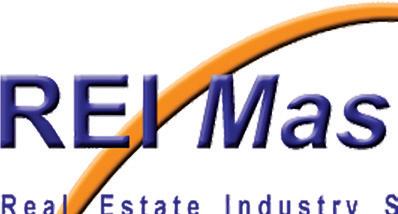



REI Master has been providing software to the accommodation industry for over 20 years. With the success of our legacy trust accounting platforms EzyRez and REI Master the business has now transformed into a webbased software company with the launch of our REI Cloud application in 2018.
Reliable, Compliant, Tested and Trusted software. We’re committed to delivering innovative solutions that provide users with an integrated trust accounting package tailored to their every business need.
Our user-friendly software is supported by our well renown friendly team backed with industry expertise.
100% Australian based business who operate entirely in-house from development, support, onboarding, and administration.
• Holiday Letting
• Permanent Rentals
• Mixed Letting
• Sales Trust & Commercial Letting
Guest Booking Portal
• Owner & Tenant Portals
• Auditor/Accountant
• Marketing Provider & More
• All In One Solution
• 3rd Party Channel Manager
• Payment Gateways
• Live Forms & More
• View availability and make a booking across multiple resort buildings
• Increase yield & occupancy by never missing an enquiry
• Monitor performance, identify trends and optimize operations



































 By Kelley Rigby, Managing Director, Lett s Group
By Kelley Rigby, Managing Director, Lett s Group
Welcome to the second half of 2024, if you can believe it! As my children get older, I realise how fast time really does pass us by.
For those of you who have been following my articles since the beginning, firstly, thank you. Secondly, my son, who was a newborn when I first started writing for Resort News, just had his school interview this month. Yep!
I’ll just let that sit for a minute… Life passes by far too quickly, so ensure you cherish every moment. Anyway, enough about all that. Let’s get into this month’s article.
Last month, we had the privilege of hosting the Women In Luncheon, a gathering that exemplified the power of networking and relationshipbuilding in the business world. As I mingled through the event, I was delighted to see not only the reunion of old acquaintances but also the formation of new connections among industry veterans and newcomers alike. This event highlighted the significance of establishing strong relationships with industry specialists and fellow management rights owners.
In the complex realm of management rights, the value of having a network of friends, colleagues, and acquaintances cannot be overstated. These connections serve as a lifeline
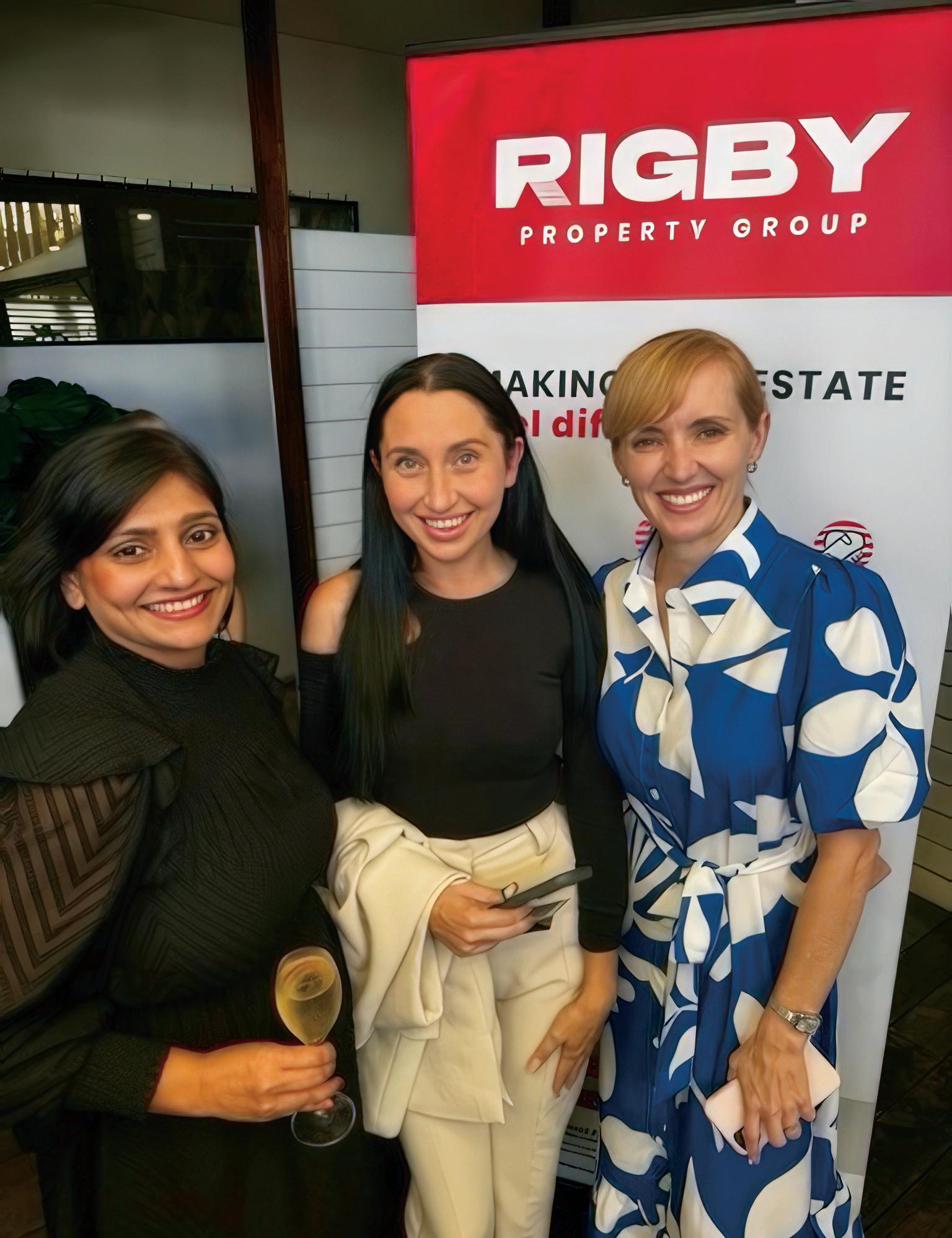
during times of crisis and can be a critical factor in achieving success in the industry. When clients seek assistance with legal matters, tenancy issues, committee challenges, caretaking duties, or any other obstacles, having a supportive network to rely on can make a world of diff erence. While no one person has all the answers, the relationships cultivated within the industry have granted me access to invaluable resources and expertise when needed.
Throughout the year, our industry hosts a plethora of social and educational events that provide opportunities for managers to come together, share experiences, and learn from one another. Beyond these formal gatherings, many managers also organise informal meetings such as lunches or dinners with fellow building owners. These sett ings off er a platform for fostering friendships, providing mutual support, and facilitating the
exchange of success stories and best practices. It is indeed a privilege to be part of an industry where colleagues and even competitors are willing to collaborate and share insights into their strategies for achieving success.
I strongly encourage you to seize the networking opportunities presented by attending industry events, organising meetings, and nurturing relationships with key figures in the field. Whether you are inviting nearby managers, legal advisors, accountants, finance brokers, or industry experts to informal gatherings, investing in these relationships can prove invaluable on your journey through the management rights industry. The friendships cultivated in these sett ings not only enhance your professional growth but also contribute to your overall well-being and success in the industry.
At the core of it all, the relationships we cultivate in both business and life contribute significantly to shaping our identity as professionals. I am immensely grateful for the mentors, colleagues, and industry peers who have influenced my path and continue to inspire me to evolve and grow. Embrace the power of networking, nurture meaningful connections, and allow these relationships to guide you on your quest for success in the ever-evolving landscape of management rights.

 By Stephen West, Interline Travel
By Stephen West, Interline Travel

Cruise holidays are synonymous with luxury, relaxation, and the indulgence of delightful offerings. Among the many choices that passengers face, the decision to opt for a beverage package can significantly enhance the overall cruise experience.
As the sun sets over the open sea, a carefully selected beverage can be the perfect companion, making understanding and navigating the world of cruise ship beverage packages a crucial aspect of planning the perfect voyage. One of the most appealing aspects of beverage packages is the convenience they offer. Cruise lines understand that passengers want to enjoy their time at sea without constantly reaching for their wallets. Beverage packages, often available for both alcoholic and non-alcoholic drinks,
provide a hassle-free solution for passengers to quench their thirst without worrying about individual drink prices. From refreshing mocktails to exotic cocktails, passengers can explore a diverse array of beverages without the burden of individual transactions.
The range of beverage packages available on cruise ships is extensive, catering to a variety of preferences and lifestyles. For those who enjoy a morning cappuccino or an evening glass of wine, some packages focus on speciality coffees and alcoholic beverages. On the other hand, families or non-alcohol drinkers can opt for packages that include a selection of soft drinks, juices, and other non-alcoholic options. The flexibility allows passengers to tailor their packages to suit their individual tastes.
While the convenience and variety of beverage packages are enticing, passengers should carefully consider their preferences and habits to determine whether such a package is a worthwhile investment. Many cruise lines structure their beverage packages as a fixed daily rate, meaning passengers pay a predetermined amount per day for unlimited drinks within certain categories. If a passenger plans to consume a substantial number of beverages daily, the package can represent significant savings compared to paying for each drink individually.
Cruise lines often differentiate their beverage packages based on the types of drinks included. Alcoholic beverage packages may cover a wide


range of cocktails, beers, and wines, while non-alcoholic packages focus on refreshing options like sodas, juices, and specialty mocktails. Some cruise lines even offer packages that combine both alcoholic and non-alcoholic beverages, providing a comprehensive solution for passengers with diverse preferences.
Passengers need to be aware of any restrictions or limitations associated with beverage packages. While the allure of unlimited drinks is tempting, cruise lines typically impose rules to prevent abuse of the system. These may include limitations on the number of drinks per day, a maximum price per drink covered by the package, or restrictions on sharing packages among passengers. Understanding these terms ensures that passengers can make the most of their beverage packages without encountering unexpected limitations.
Travelling with a luxury line allows this to be a moot subject where Silversea, Seabourn, and Regent Seven Seas Cruises include the beverage package and most a mini bar in the cabin. Companies like Oceania and Azamara have opt-in packages. Beverage packages on cruise ships offer a tantalising opportunity for passengers to elevate their onboard experience. The convenience, variety, and potential cost savings make these packages an attractive option for many travellers. However, the key to making the most of beverage packages lies in thoughtful consideration of individual preferences, habits, and the specific terms associated with each cruise line’s offerings. As passengers sip their favourite beverages against the backdrop of the open sea, the allure of well-designed beverage packages becomes clear – a delightful addition to the tapestry of a memorable cruise vacation.

The Australian Tourism Exchange (ATE) will return to Brisbane/ Meanjin from April 28 to May 1, 2025, for the first time since 2007. This major tourism trade event will be held at the Brisbane Convention & Exhibition Centre.
Federal Minister for Trade and Tourism Senator Don Farrell highlighted ATE’s importance for connecting the
Australian tourism industry with wholesalers and retailers from 30 countries. With Queensland preparing for the 2032 Olympics, the event will benefit both international buyers and local businesses.
Queensland’s Tourism Minister Michael Healy emphasised ATE’s role as the marquee event for the industry and expressed excitement about showcasing new tourism infrastructure in Brisbane. He noted Queensland’s strong history of participation
The 44th edition of Tourism Australia’s premier event, the Australian Tourism Exchange (ATE), was held in Melbourne/Narrm from May 20 to 23, 2024.

and the potential for new achievements in 2025.
Tourism Australia Managing Director Phillipa Harrison mentioned that ATE25 will focus on driving sustainable growth for the industry. She praised Melbourne’s hosting of the event this year and looked forward to returning to Queensland.
Tourism and Events Queensland CEO Patricia O’Callaghan estimated the event will boost the Queensland economy by $8.5 million. She highlighted ATE’s
Hosted in partnership with Visit Victoria at the Melbourne Convention and Exhibition Centre, the event saw 1500 members of the Australian tourism industry meet with 714 global tourism wholesalers and retailers across around 50,000 one-on-one business appointments.
role in fostering relationships and future business, aiding in reaching the goal of $44 billion in overnight visitor expenditure by 2032.
Brisbane Economic Development Agency CEO Anthony Ryan said the city was ready to host ATE25 and will welcome the global recognition as a top destination.
ATE25 will be delivered by Tourism Australia in partnership with Tourism Events Queensland and the Brisbane Economic Development Agency.
ATE24 also provided international buyers with opportunities to experience Australia’s tourism offerings firsthand. The business generated at ATE24 will be crucial for the future of the Australian tourism industry as we aim to return to 2019 levels of international travel.


Following three successful events last year, Visit Sunshine Coast is taking its Sunshine Soirees back on the road.
The events, designed for event buyers including PCOs, corporates, events agencies, EAs, and PAs, will be hosted by Visit Sunshine Coast Head of Business Events Ali Thompson.
The first soiree kicks off in Sydney on June 14, followed by the Sunshine Coast on August 23, and Melbourne on October 10. The Sydney Soiree at the Ivy Sunroom will immerse
attendees in the essence of the Sunshine Coast with cocktails, cuisine, and entertainment by Brihony Dawson.
There will be prizes, including overnight stays and activities from Sunny Coast suppliers like Kingfisher Bay Resort, Australia Zoo, and Novotel Sunshine Coast Resort.
Attendance is exclusively for event buyers with business events earmarked for the Sunshine Coast. Interested parties are encouraged to express their interest by completing the Expression of Interest form provided.
To register your interest in the upcoming Sunshine Coast (23 August) and Melbourne (10 October) Sunshine Soiree’s please email businessevents@visitsunshinecoast.com

Award-winning family favourite, Oaks Sunshine Coast Oasis Resort, has teamed up with the crew from Australia Zoo to create the ultimate Sunshine Coast escape for families, including cash to splash on eating out, zoo entry and a bottle of wine.
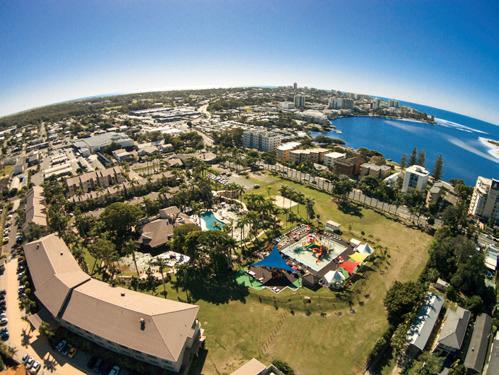

RACV Royal Pines
Resort has launched a 24-metre-long LED screen, the largest in the Southern Hemisphere, as part of a multi-milliondollar investment in immersive technology.
This upgrade, which includes advanced audio-visual systems and enhanced accessibility features, reinforces the resort’s position as a leader in the Australian conferencing and event market.
Key features and upgrades include:
• 24-metre LED screen.
• Advanced audio-visual systems: motorised cameras,
stage lighting, distributed audio system, laser projectors, mobile staging.
• Enhanced outdoor lighting and accessibility
Event capabilities:
• 15 versatile event spaces.
• Capacity for up to 1800 delegates.
Resort Manager Martin Zumstein highlighted the blend of business and pleasure offered by the resort’s comprehensive facilities and meticulous attention to detail. With these upgrades, RACV Royal Pines Resort sets a new standard in the conference and event market, ensuring memorable experiences for all guests and delegates.


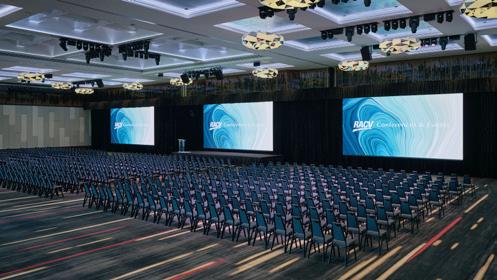

The Martini Room at the iconic Story Bridge Hotel buzzed with excitement on Thursday, May 9, as Queensland’s accommodation and real estate sectors’ elite gathered to celebrate a significant milestone: the relaunch of RAAS Property Group to Ras360 Property Solutions.
The event marked the company’s 21st birthday and showcased its bold expansion into accommodation business sales.
The rebranding launch was a spectacular event attended by the “who’s who” of the accommodation sector, including key figures from the industry’s business owners and professional services, along with the company’s growing agent and broker cohort that services much of South East Queensland.
Christopher Jones, Managing Director and owner of Ras360 and prestige real estate brand Republik Property Partners, delivered an emotional thank you speech, expressing deep gratitude to the loyal and long-standing team that has supported him over the years. He applauded the group’s hard work in ranking as Queensland’s fourth-largest seller of real estate (RealEstate.com.au November 2023 to date).
Founders of RAAS, Rusty Lush, Geoff Glanville, and Mike Butler, were celebrated on the night, ceremoniously cutting a fittingly red ‘21’ cake. Industry stalwart and Director of Management Rights, Robert Collins, shared heartfelt stories from the company’s inception to its current success, crediting Christopher Jones for nurturing a team with unwavering ethical determination.
National Director of Accommodation, Nathan Eades, filled the room with his excitement for


his appointment to lead this new sector into the future, with a reinvigorated heritage brand and an expert team of brokers in place. With over a decade of industry experience and multiple awards, including the ARAMA Sales Broker of the Year for 2020 and 2021, Nathan’s leadership is set to drive the company’s ambitious expansion into new asset classes, including hotels, motels, pubs, and caravan parks.
Julia Kent, the company’s Growth Manager leading the relaunch and expansion, accredited the successful transformation to the company’s value of constant innovation and customer-centricity. The speeches were interjected by Kerrie Lush, founder Rusty Lush’s daughter and a long-standing broker for the company, who praised exceptional leadership and genuine care for people as driving forces for the honourable team culture that Christopher has cultivated.
The rebranding to Ras360 Property Solutions signifies more than just a name change. It marks the beginning of a new chapter, positioning the company as a comprehensive, in fact a 360-degree, provider of residential and accommodation property solutions. The expansion into a diverse range of asset classes aims to challenge the industry status quo and offer more holistic services


to clients. The addition of industry experts like Malcolm O’Farrell and Joel McCartin to the team underscores this commitment.
The rebrand went live in mid-April, with the launch of a new accommodation team, a new website ras360.com.au, along with a Partner Portal, designed to support and grow the Ras360 team across Australia. The Ras360 rebrand launch event was a testament to the company’s importance and honourable team dynamic. With a strong leadership team, depth of experience in their staff unit, and importance placed on constant innovation, Ras360 Property Solutions is set to redefine the landscape of the accommodation and property sectors in Australia.













A big thank you to everyone who attended the Gold Coast luncheon. It was an enthusiastic turnout at The Island Rooftop for the launch of Rigby Property Group! It was a fantastic day of connection and camaraderie. We are so fortunate to be part of such a brilliant industry, and these events truly highlight the strength of our community. Special congratulations to host Kelley Rigby on the launch of her new venture!




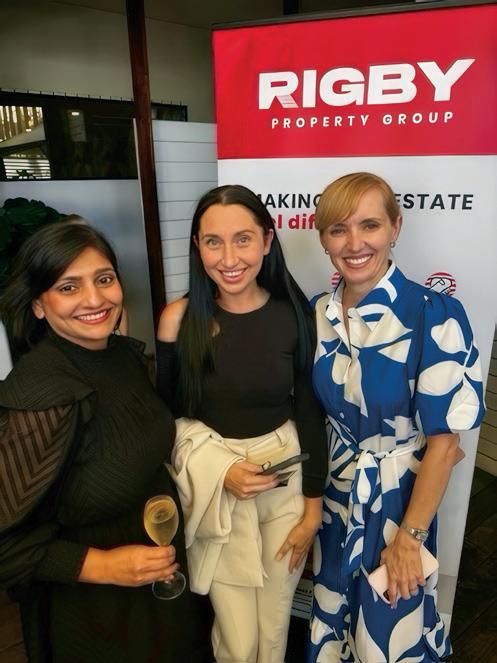
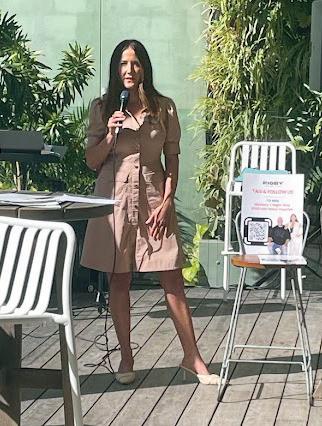
The Friday luncheon held in The Lawn, Kangaroo Point, was hosted by SSKB and featured the showcase of the latest generation of the SSKB Strata Managers App. SSKB is highly innovative and dedicated to simplifying the lives of those living in strata schemes by streamlining the navigation of their body corporate responsibilities. It was another fabulous afternoon for all, spent with industry peers.
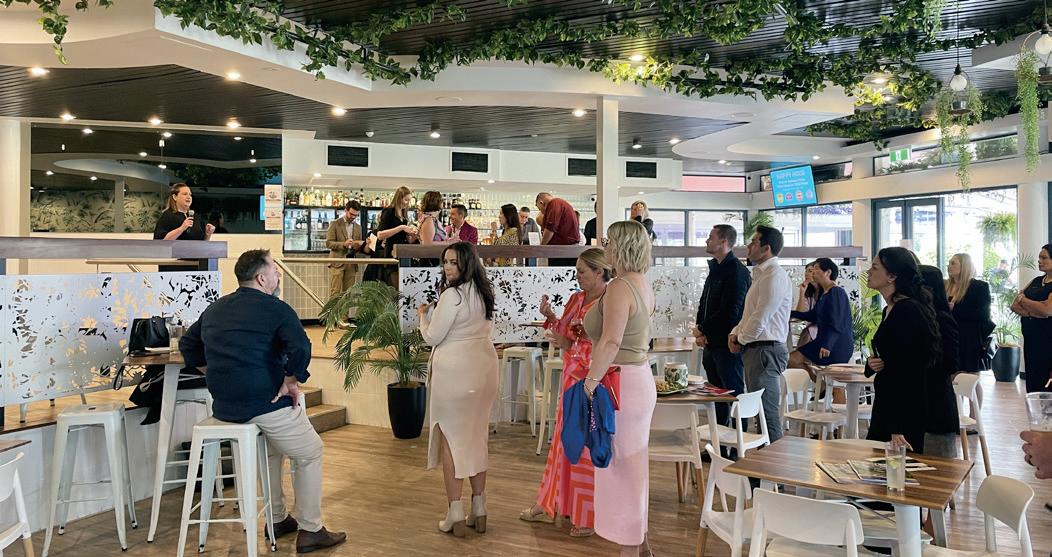














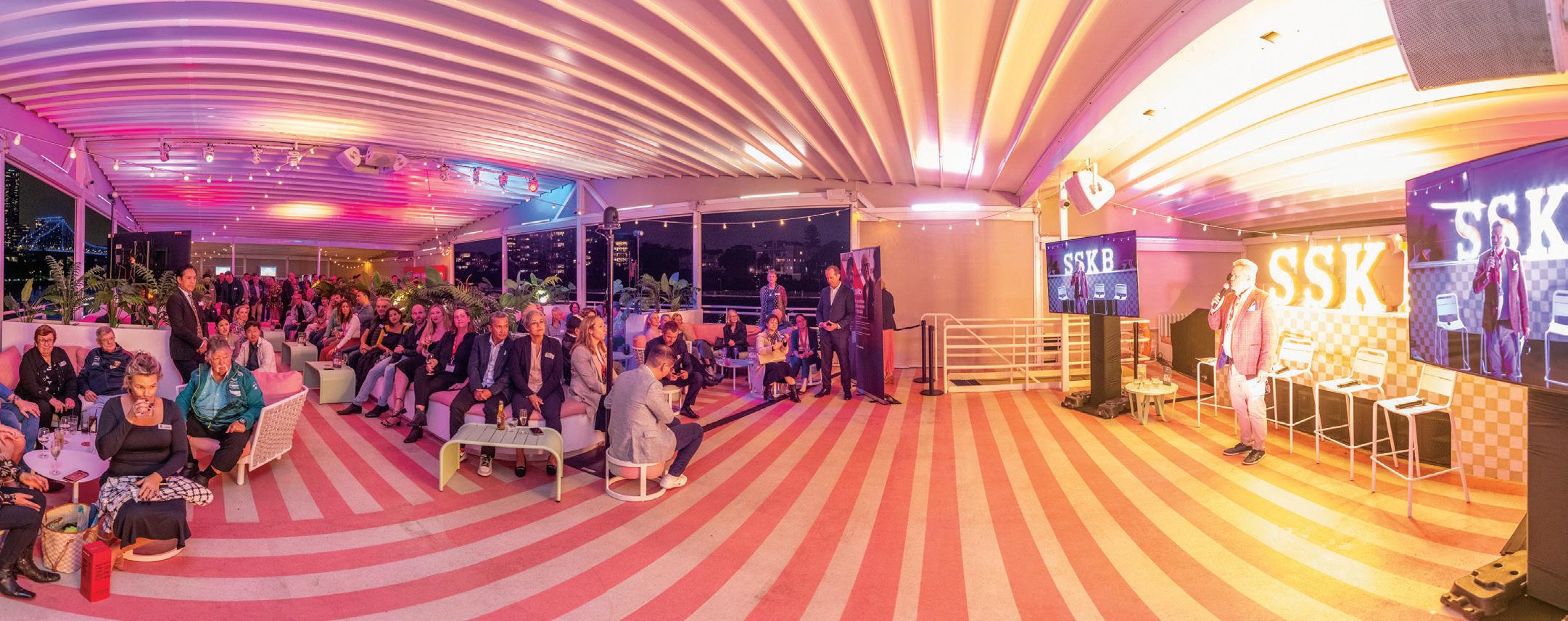
SSKB invited committee members, building managers, and industry connections to a night on the water onboard the stunning Oasis to launch their next-generation SSKB Strata app.
This special event was not just a cruise along the beautiful Brisbane River but also a milestone for SSKB Strata Managers. Committee members and building managers who joined SSKB were given a presentation from the company’s directors and executive management about the new SSKB app, which is a real game changer.
The future of strata management just got brighter, and SSKB is excited to navigate this journey with their buildings. SSKB is keen to revolutionise the way they connect and manage their communities!




Some of the Resort News team represented our publications and AccomProperties at the 2024 National Conference for the Caravan Park Industry last month.
The three-day conference, hosted by the Caravan Industry Association of Australia, kicked off with over 100 exhibitors and a record-breaking 1080 delegates.
CIAA took over RACV Royal Pines Resort to showcase a whirlwind of innovation, celebrate camaraderie, and inspire insightful dialogue dedicated to the future of the beloved Australian caravan and camping industry. We were there as media partners and to showcase our accommodation magazines and accommodation sales portal.
feature:

We enjoyed a jam-packed couple of days including golf, entertainment, fireworks and a spectacular awards show. We caught up with many operators and accommodation trade suppliers, all there to learn, grow, connect, and do business!













Save the date for Resly’s Best of Tourism Awards 2024
Where? Star Casino Gold Coast When? October 8, 2024.
It’s time to start planning your outfit the theme of this year’s Best of Tourism Awards annual gala is Secret Garden!
Last chance for tickets: Don’t miss out!
ARAMA, The TOP Awards 2024 will be held on July 23, at Sea World Resort, Gold Coast.



























Palm Beach QLD
ID: 8546
Exclusive | Mix of Holiday & Permanent
Asking Price: $1,629,000 Net Profit: $162,000
Phil Trimble 0418 478 966

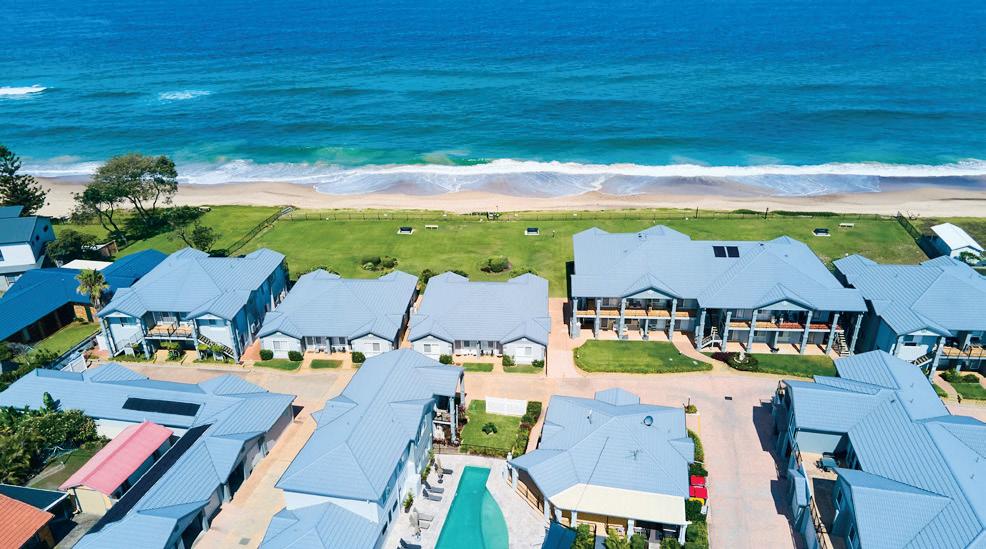
Old Bar NSW
ID: 8781
Private Absolute Surf Beachfront
Asking Price: $2,053,000 Net Profit: $365,000
Michael Philpott 0433 137 927





QLD

ID: 8595
Exclusive | Absolute Beachfront
Asking Price: $795,000 Net Profit: $101,800
Antonio Curulli 0488 030 853

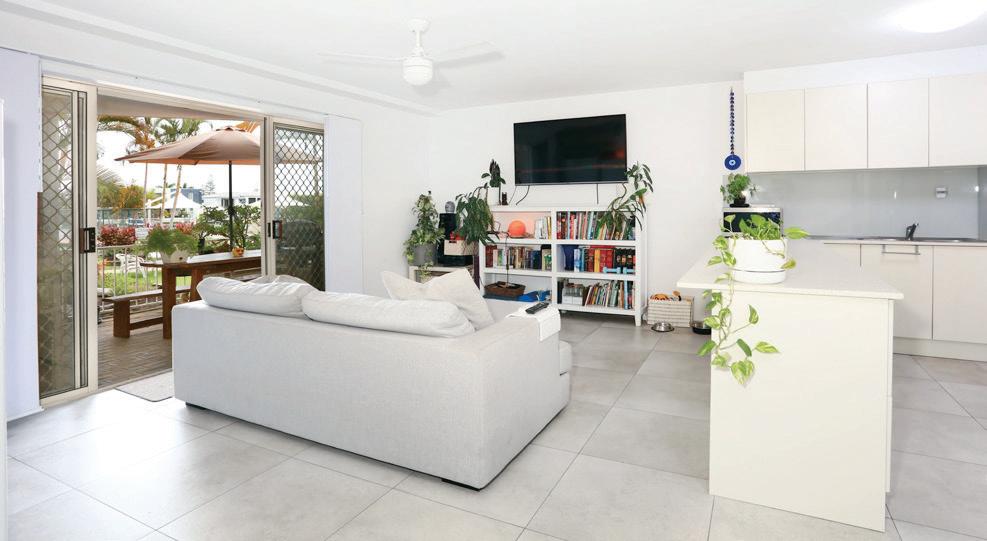
Waters QLD
ID: 8503
Spacious Waterfront Quality Unit
Asking Price: $1,879,000 Net Profit: $224,048
Bill He 0439 288 960


















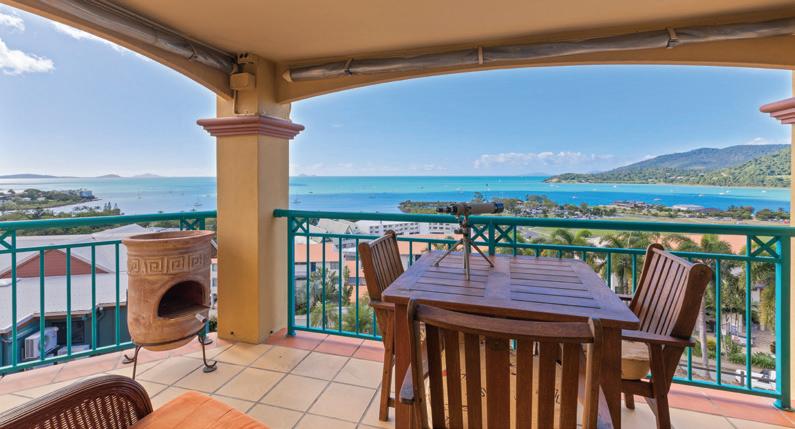

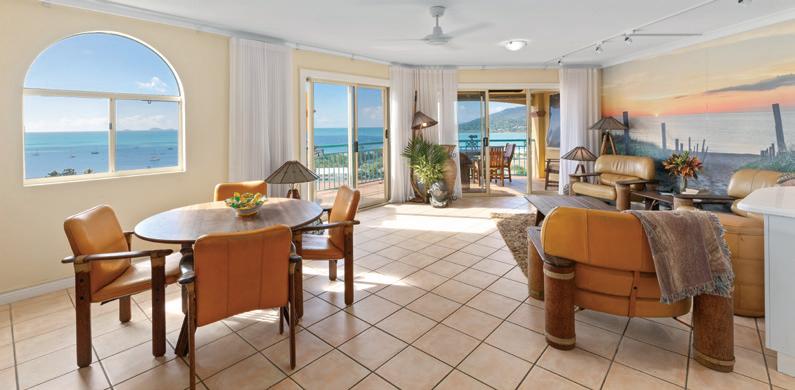
Fabulous Tuscan themed Management Rights in the heart of Airlie Beach and o ering superb views over the Coral Sea and Whitsundays.
Purchase Management Rights and Manager’s 3 Bedroom Apartment PLUS o ce on title...
• Under current ownership for 17 years
Management Rights business only – Also no requirements to live on site!
• Great lifestyle for a management team
• New 25 year agreements from April 2024
• 19 spacious well equipped self catering guest apartments in the letting pool
• Net $327,703 which includes a Body Corporate salary of $106,467 (ex GST)



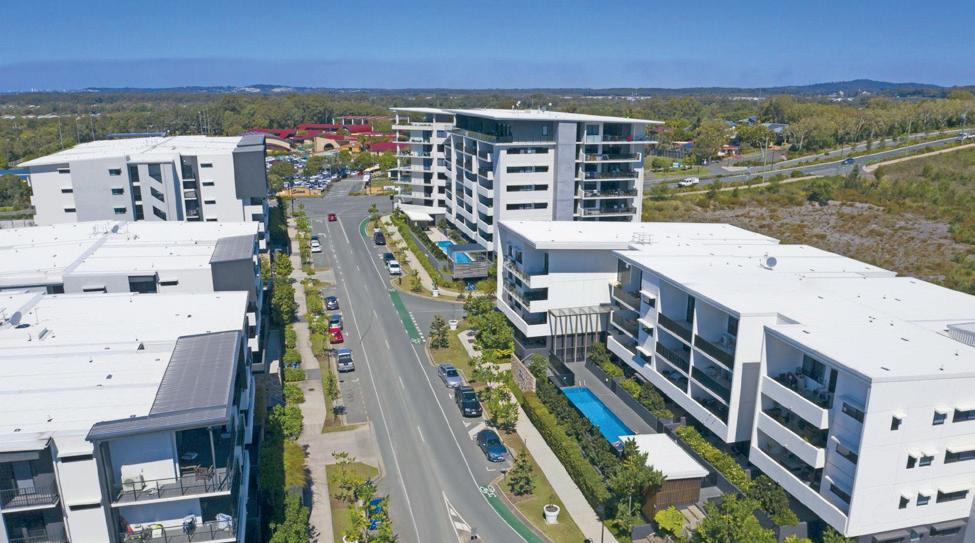
Contact: Peter Ward, 0412 001 700 sales@wardcommercial.com


Contact: Gordon Fridge, +64 221 569 330 gordon.fridge@linkbusiness.co.nz
Contact: Chris Cameron, 0408 192 490 chris@offmarkethotels.com.au

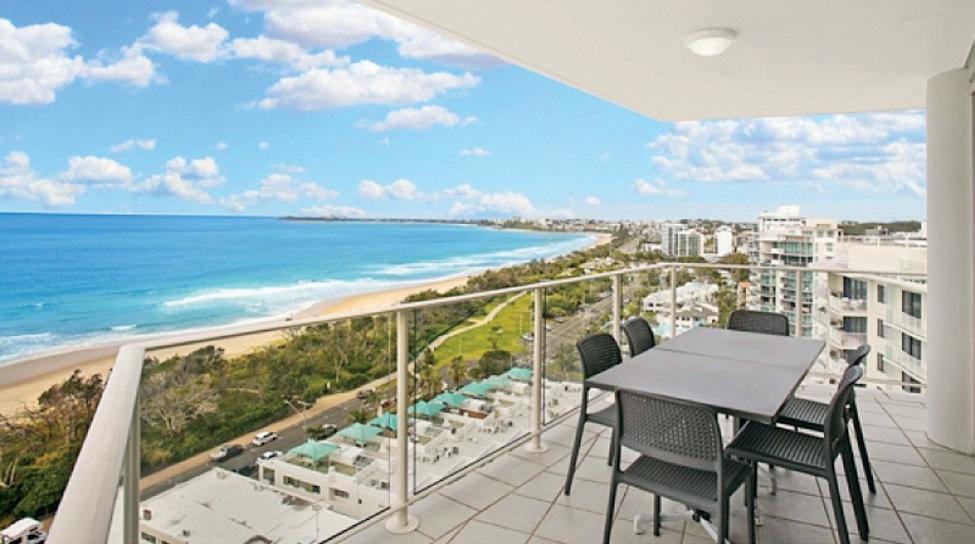
Contact: Wayne Stoll, 0425 181 505 wayne@thinkmanagementrights.com.au

Contact: Nathan Eades, 0408 192 490 nathan@ras360.com.au













 By Mandy Clarke, Editor
By Mandy Clarke, Editor
In 2006, Tamara and Geoff Hussin sold their automotive business and set off on an 18-month caravan adventure across Australia with their young family. Little did they know this journey would lead them to a new industry, a new home, and successful management rights businesses on the beautiful Sunshine Coast. Nearly two decades later, they still love their lifestyle, the locale, and this industry.
Their path to management rights began with a serendipitous encounter when relatives on the Gold Coast handed them an old copy of Resort News. A move that sparked their curiosity.
Geoff considers the magazine, which has been around for almost 30 years to be his gateway into the management rights industry. “We parked our caravan at a friend’s property in Yandina and contacted Resort News, which coincidentally at that time had an office in Eumundi,” he said.
“I collected the four most recent publications and read them cover to cover. Immediately, we reached out to three brokers advertised in the magazine and started inspecting properties.”
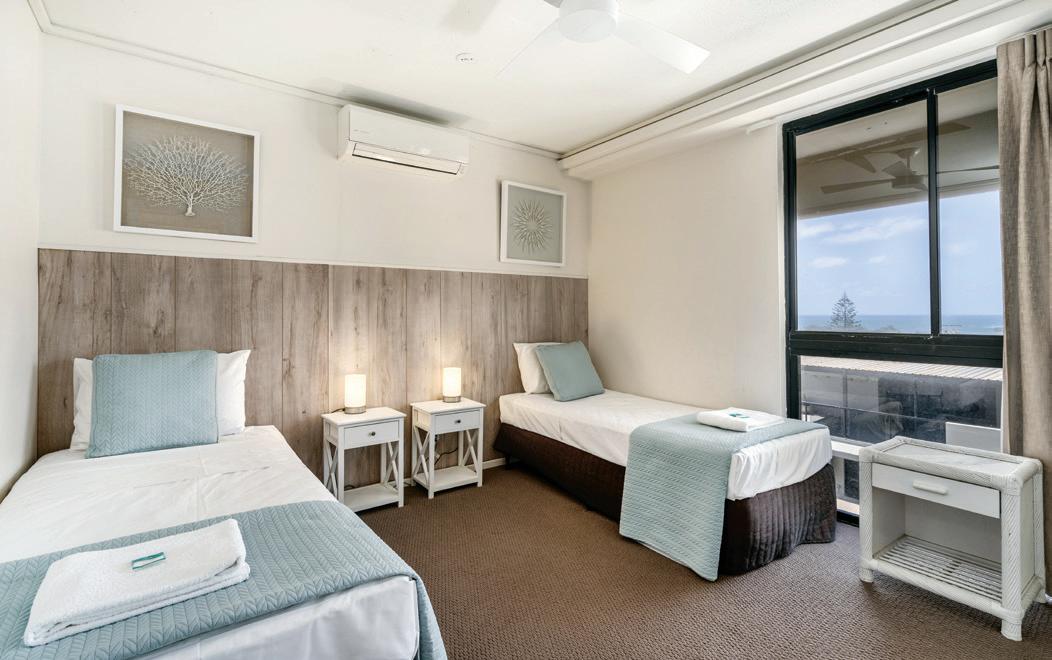

One of those brokers, Glenn Millar from ResortBrokers, introduced them to Element on Coolum Beach. For Geoff and Tamara, it ticked all of their boxes. They made an offer and moved to Coolum.
After a successful stint with Element, they sold the property and acquired Ivory Palms Resort in Noosaville, once again with Glenn’s assistance. Over eight years, they transformed Ivory Palms into a four-star gem, adding popular features like a giant jumping pillow and creating PK’s Café and Bar.
“The committee gave us extra land and even went half on the concreting cost. We craned in a large wood-fired pizza oven, put in a roof and lighting, and called it PK’s Café and Bar after our youngest daughter Katelyn. Tamara always called her ‘Precious Katelyn,’ and I called her ‘Pretty Katelyn,’ so, everyone called her ‘PK,’” Geoff explained. Katelyn, now 18, who grew up helping out at Ivory Palms, is now studying to be a conductor at the Sydney Conservatorium of Music!
Popular PK’s Café and Bar, known for its wood-fired pizza, became
a magnet for families and helped to significantly boost the resort’s occupancy to over 95 percent.
“It was one of the best things we’ve ever done,” Geoff said.
Their hard work not only earned them great reviews and awards for their pizzas, but they also won the prestigious ARAMA Resident Manager of the Year Award. In September 2021, they sold Ivory Palms.
After a break from management rights, they reached out once more to Glenn Millar about Clubb Coolum Beach Resort, a property they had long admired. Although
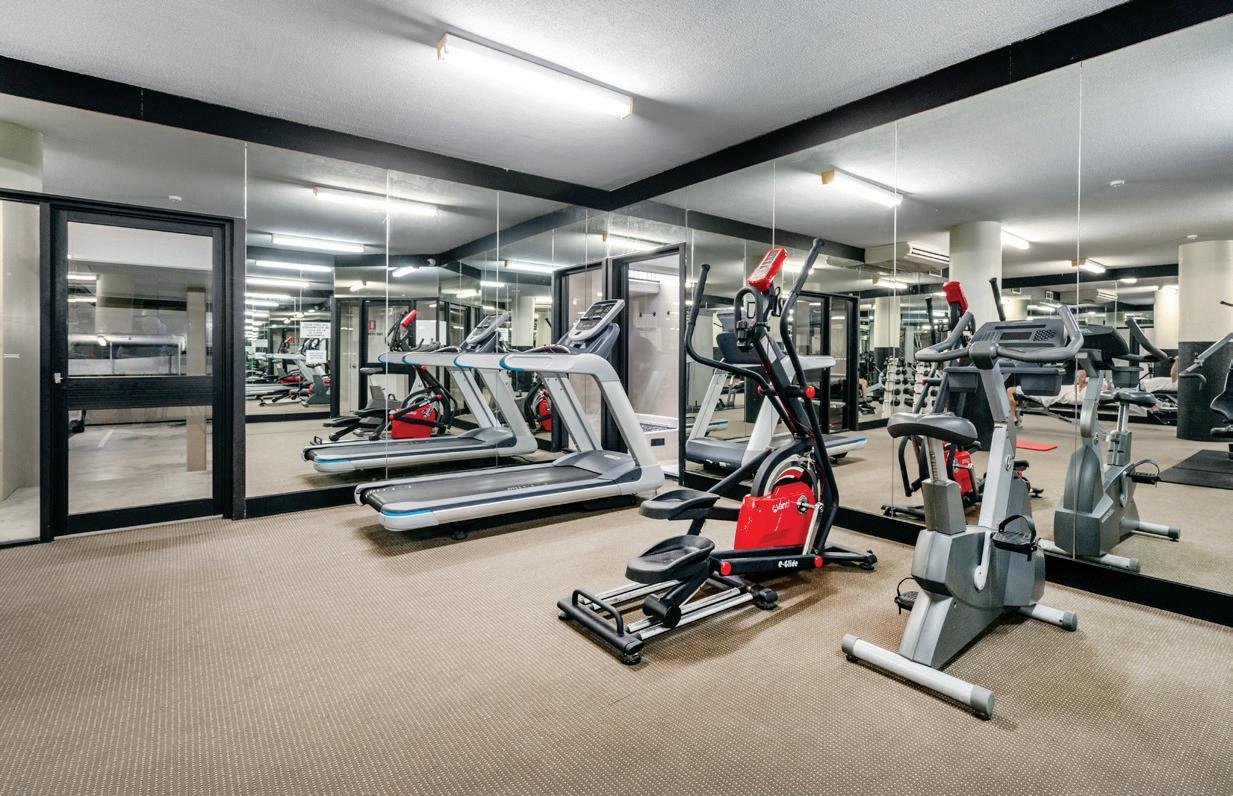
it wasn’t officially on the market, their offer was accepted, and they settled in January 2024.
Clubb Coolum Beach Resort, with its prime location opposite a popular patrolled beach, offers luxurious accommodations with breathtaking views.
With 65 self-catering apartments, Tamara and Geoff were eager to apply their expertise to this stunning property. The previous owners had been there for 18 years, and the supportive body corporate was thrilled to welcome them. They resumed their work, aided
by “trusted professionals like Tony Rossiter, Lel Parnis from Holmans, and Trent Pevy”, and continued to rely on the “excellent HiRUM Software”. Of course, they also remain avid readers of Resort News
Their long-term, very loyal and “wonderful” staff, Anita Smith and Samantha Atkinson, followed them to Clubb Coolum Beach Resort. With Anita living onsite, Tamara and Geoff can balance their work at the resort with managing their 24-acre property at Cooroy Mountain, where they enjoy breeding Miniature Belted Galloway cattle.
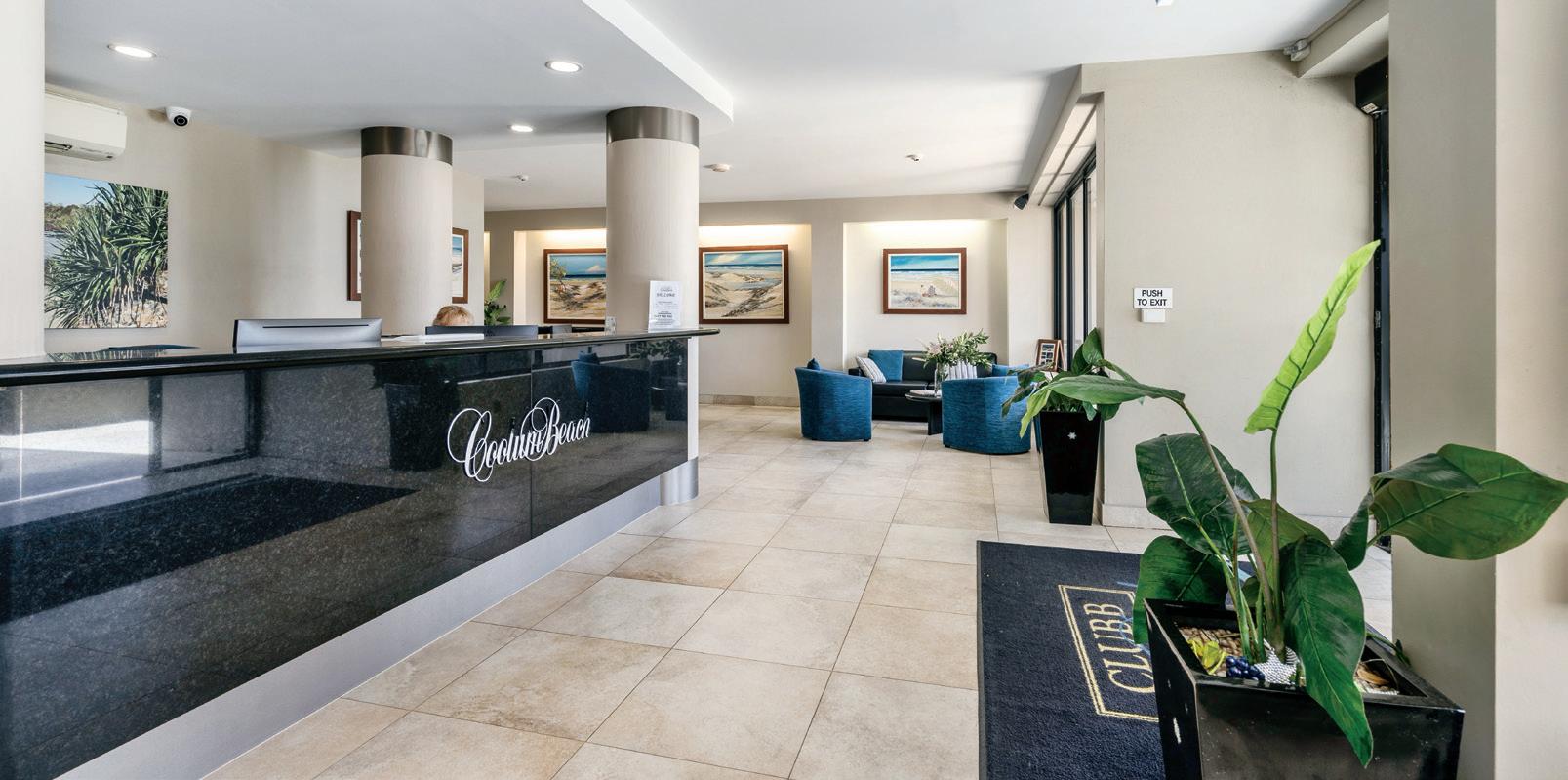


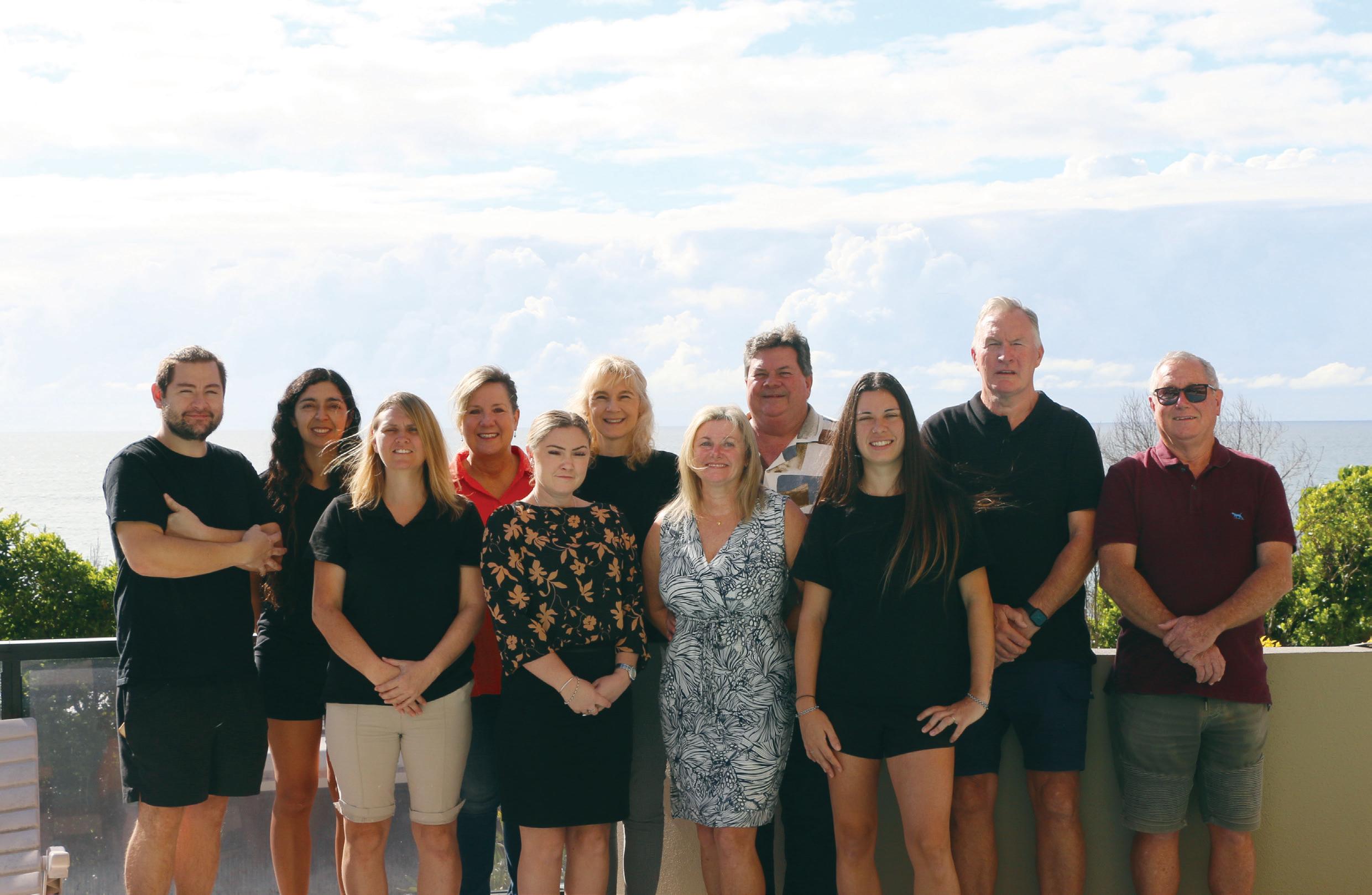
Their path to management rights began with a serendipitous encounter when relatives on the Gold Coast handed them an old copy of Resort News
Another of Geoff ’s passions is cricket, it has been a significant part of his life. He once bowled alongside Dennis Lillee in a charity match in England and played grade cricket in Sydney with top players like Mark O’Neill and Phil Emery. Despite never reaching Test level, these experiences were invaluable.
Upon returning from playing professional cricket in England, Geoff met Tamara,
and they opened a successful car yard in Gosford. After selling it, they travelled Australia, which ultimately led them to Coolum and the management rights industry.
Since taking over Clubb Coolum Beach Resort, Geoff has focused on improving the resort’s management systems, launching its new website, and enhancing marketing efforts. Occupancy has soared,
thanks in part, Geoff says, to the support from Robert Taylor Tailored Hospitality services.
Meanwhile, Tamara is busy sharing her refurbishment and design experience with unit owners to suggest improvements in the apartments. Generally, the building is in great shape but Tamara’s audits detail suggestions to bring units up to a 4.5-star level. She advises what should be done immediately to
improve the rooms and creates a plan for future improvements. Tamara assists owners in refining and refreshing their offerings, to elevate the guest experience and ultimately optimise nightly rates.
The resort’s letting pool currently consists of 43 units. However, Tamara, who is also the business’s real estate agent, has already achieved her first real estate win-back.
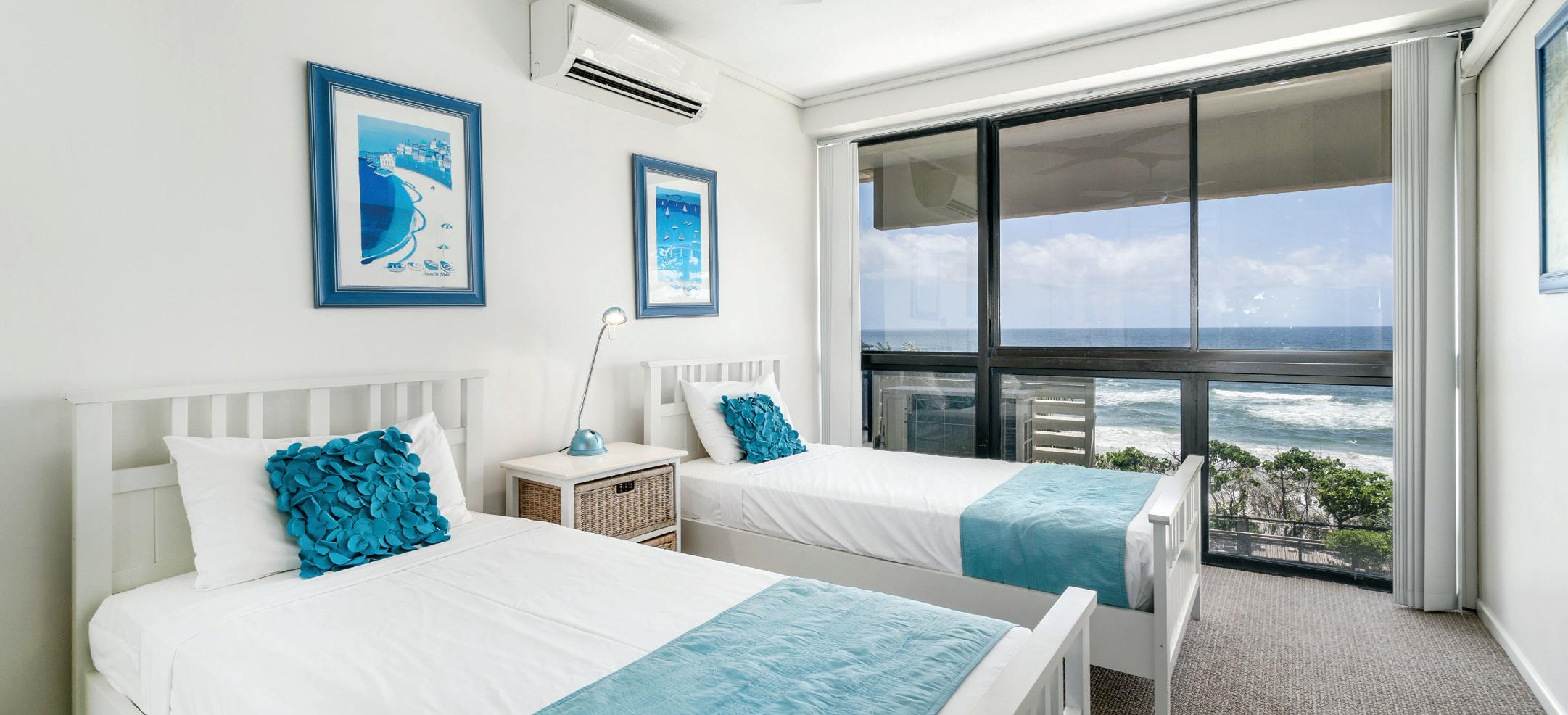
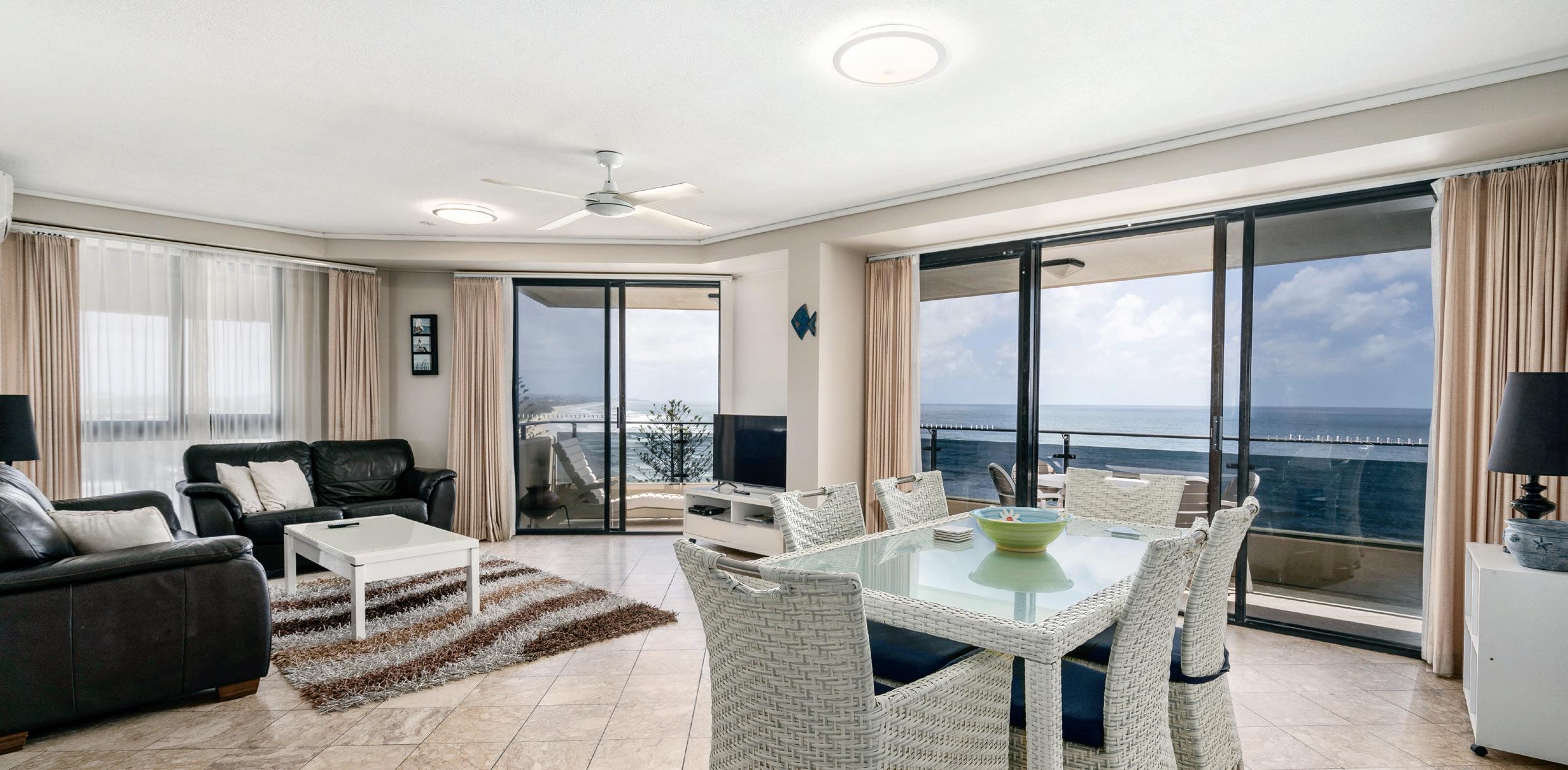
Furthermore, Geoff reveals what he calls “the icing on the cake”: the couple is about to develop the resort’s rooftop into a restaurant and bar. “It’s a couple of years down the line,” he said. “We need council and liquor licenses, but we are confident of a positive outcome. We are very excited about its potential.”
With phenomenal sea views and three-quarters of Clubb Coolum’s rooftop having exclusive use, it is perfect for the type of incredibly popular F&B offering that these savvy operators certainly know how to create.
These past winners of ARAMA Awards are surely poised for

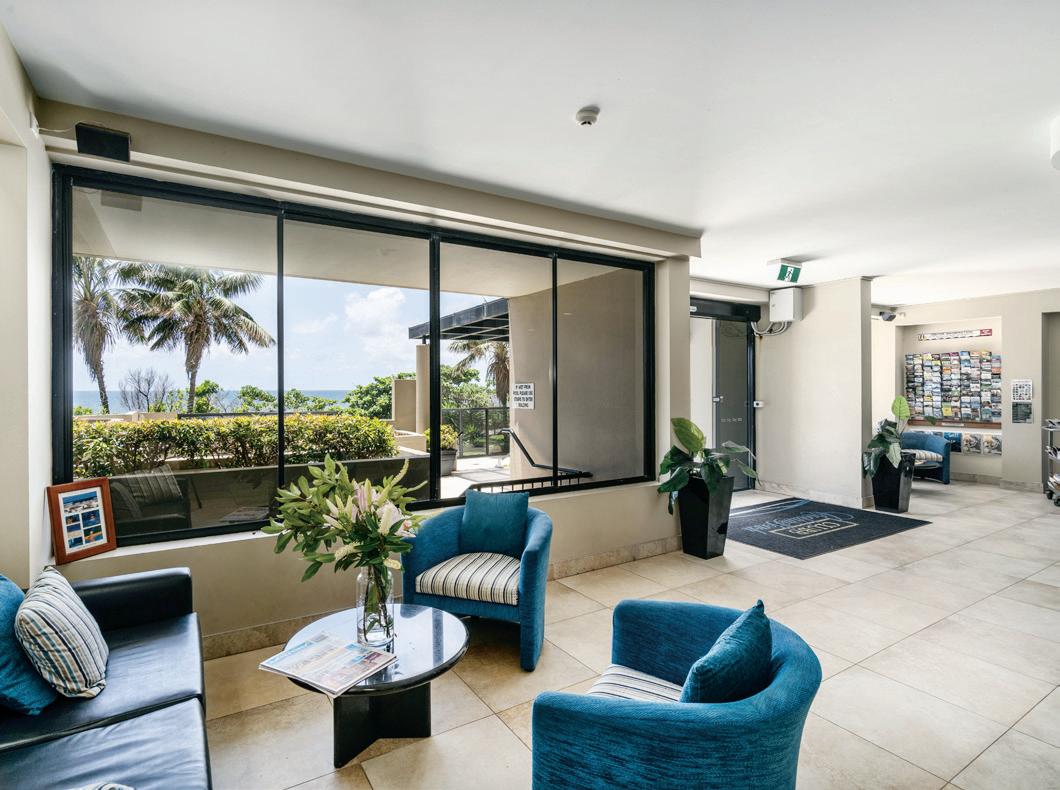
more recognition for their tenacity, business acumen, and passion for the industry. However, for them, the biggest award is the wonderful people (many now firm friends) in management rights, the hospitality, the fabulous lifestyle, and business opportunities.




















Confident in the future of the management rights industry and grateful for their professional network’s support, Tamara and Geoff ’s journey has been incredibly rewarding. They look forward to continued success at Clubb Coolum Beach Resort, where their passion and expertise shine.






















